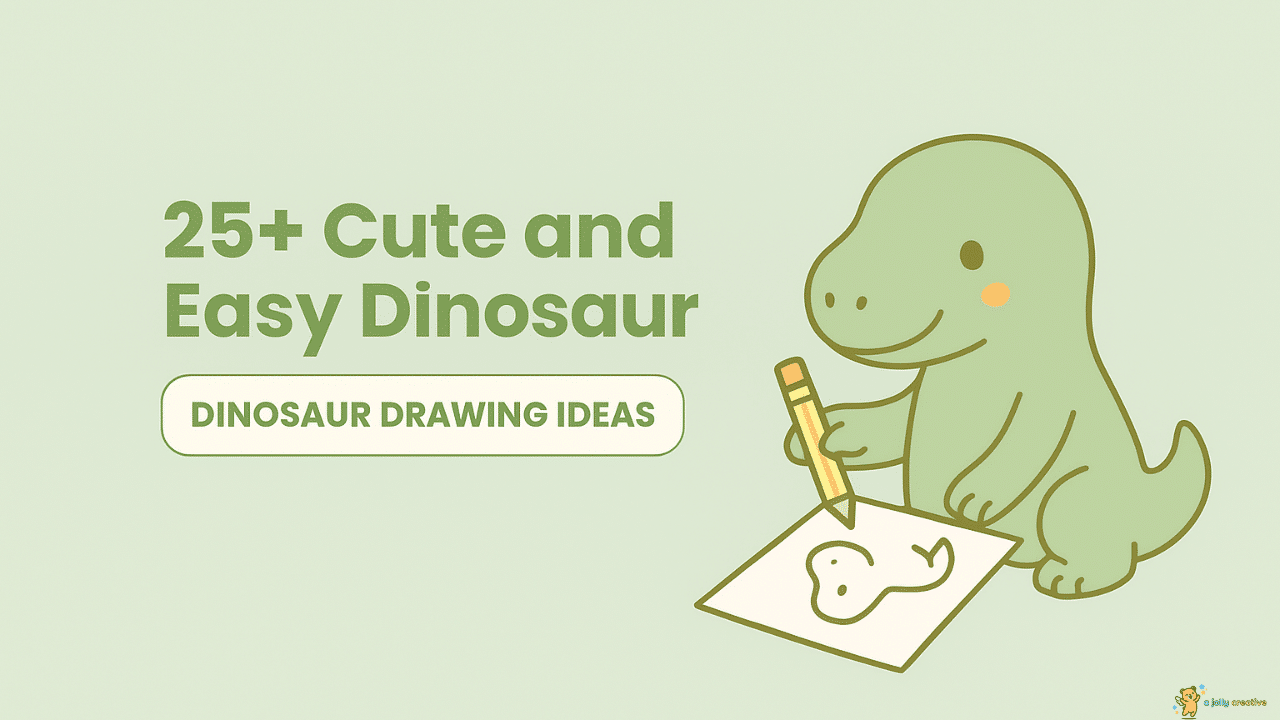Imagine your friend runs up, eyes sparkling, and says, “Draw me a dinosaur!” Don’t worry if drawing feels tricky—cute dinosaur drawings are super easy and fun! Dinosaurs are awesome because they mix real history with tons of creative fun, perfect for all ages.
From the fierce T-Rex to the gentle Brachiosaurus, these easy dinosaur drawing ideas turn simple shapes into cool dino art. Whether you’re just starting or helping a buddy, these projects are great for beginners and spark creativity. Grab a pencil and let’s roar into some dino-drawing fun!
A Gentle Smiling Tyrannosaurus
Tyrannosaurus Rex presents the ultimate challenge in making fierce creatures appear friendly.
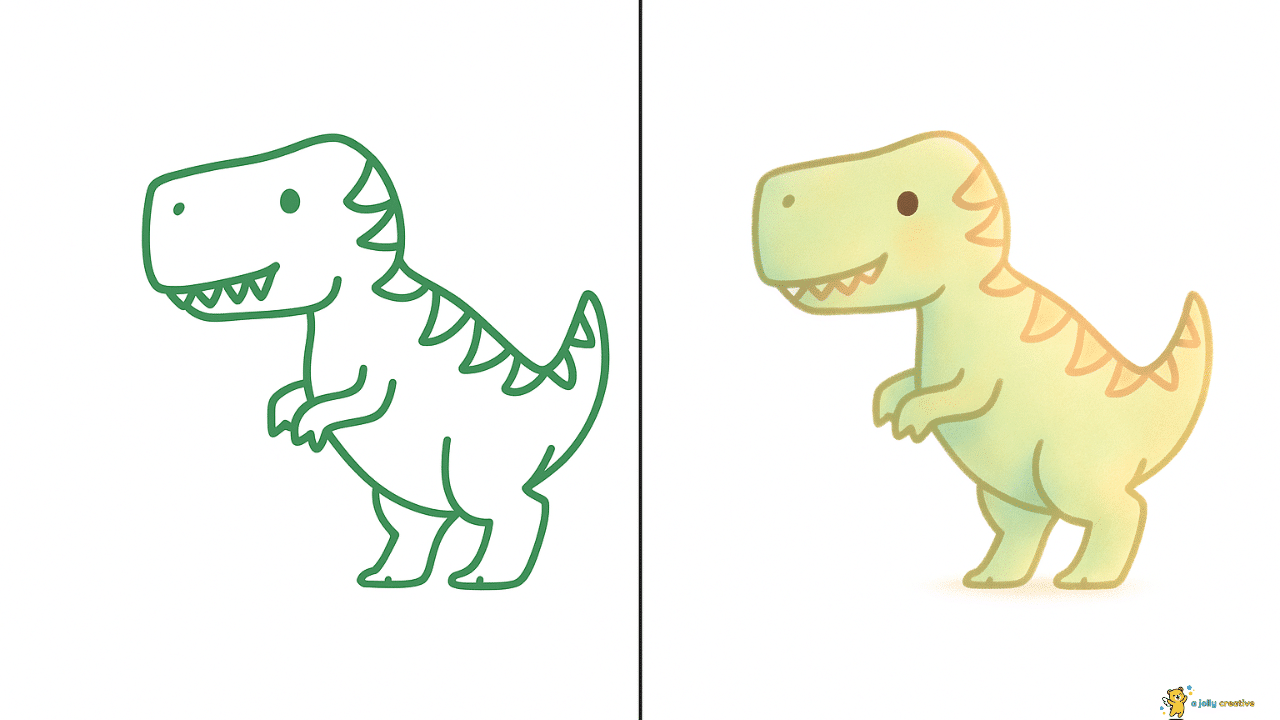
These large predators dominated their ecosystems, yet artistic interpretation can emphasize gentleness over aggression through careful attention to facial expressions and body language.
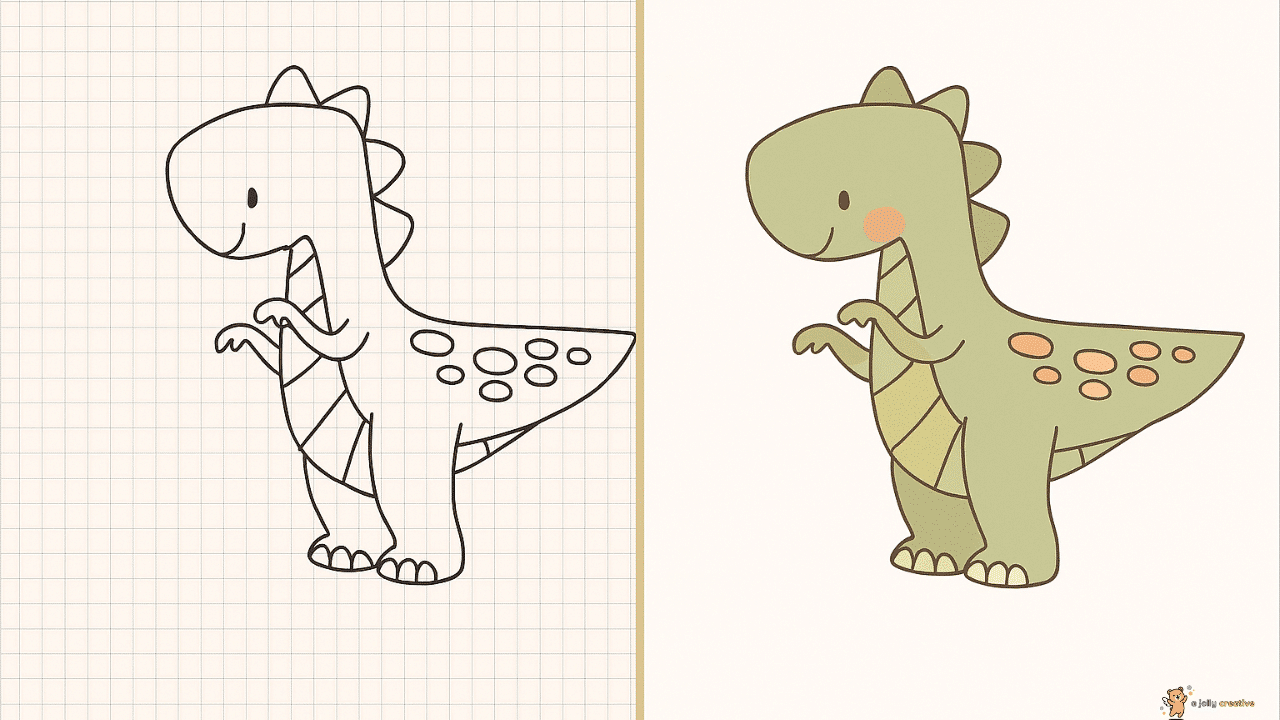
Focus on the eyes as the primary tool for conveying personality. Large, kind eyes with long eyelashes can instantly transform the most fearsome predator into an approachable character suitable for child-friendly art. Keep the mouth closed or show just a gentle smile to maintain the peaceful aesthetic.
Happy Smiling Baby Dinosaur
Baby dinosaurs make perfect starting projects because their proportions are naturally cute and forgiving for beginning artists.
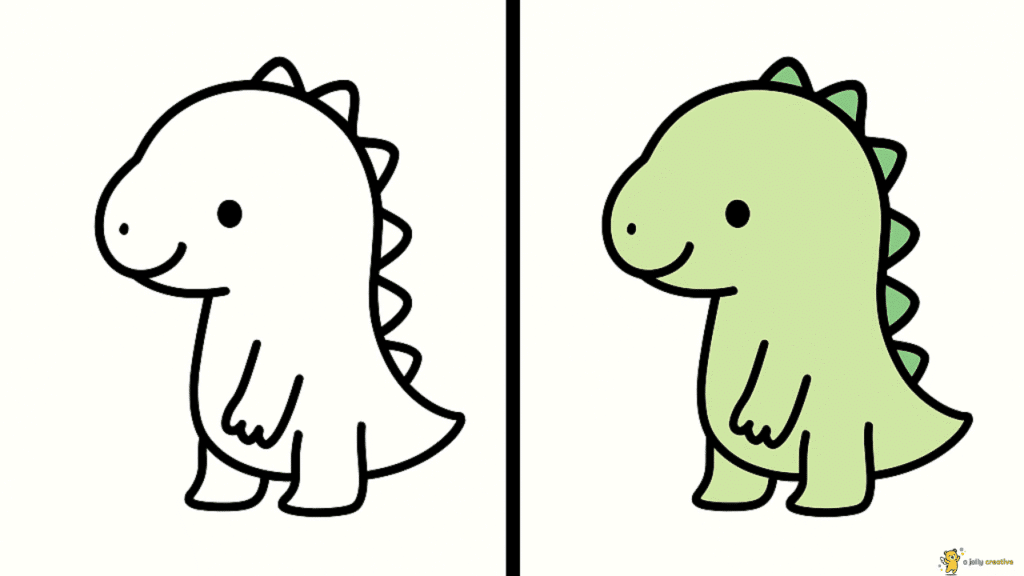
Add tiny legs using simple rectangles, then round the edges for a softer, more approachable look. The key to successful cute representations lies in the facial expression – large eyes, small smile, and gentle features transform any dinosaur species into an approachable character that children find delightful rather than frightening.
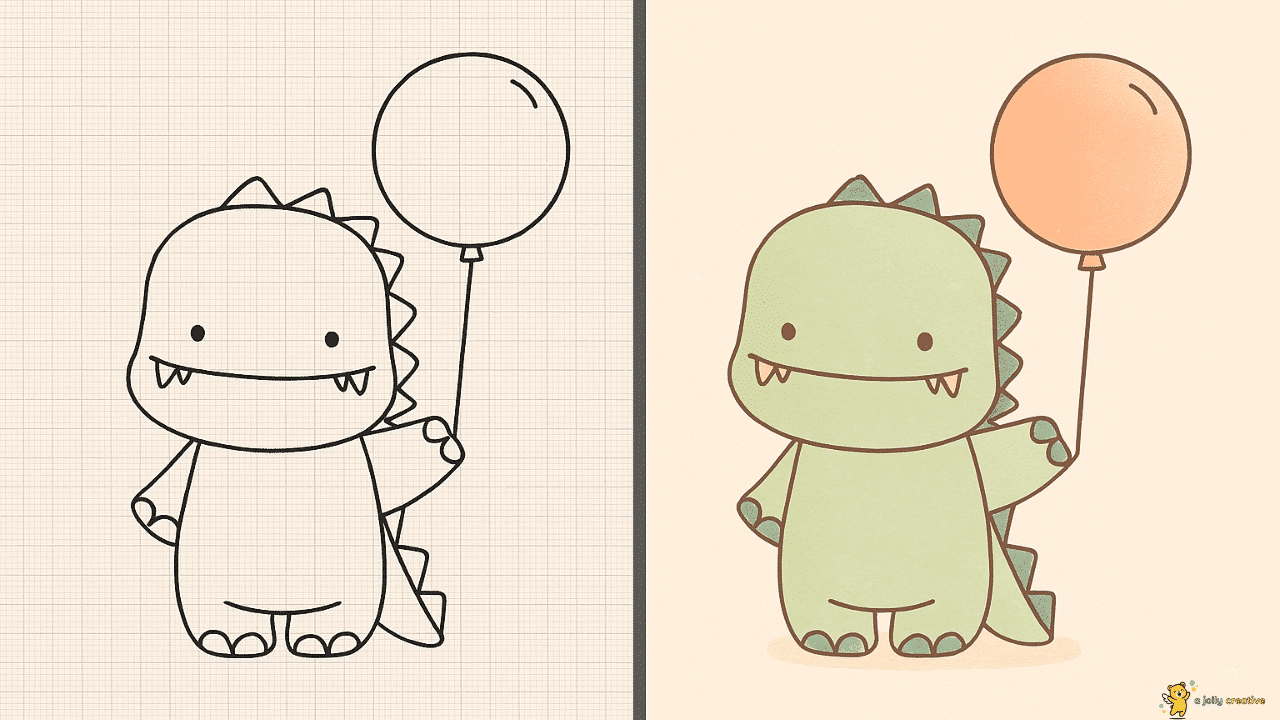
These elements enhance the playful designs without overwhelming the basic structure, creating cartoon style dinosaurs that encourage young artists to continue developing their drawing skills through positive reinforcement.
A Cute Friendly Tryceratops
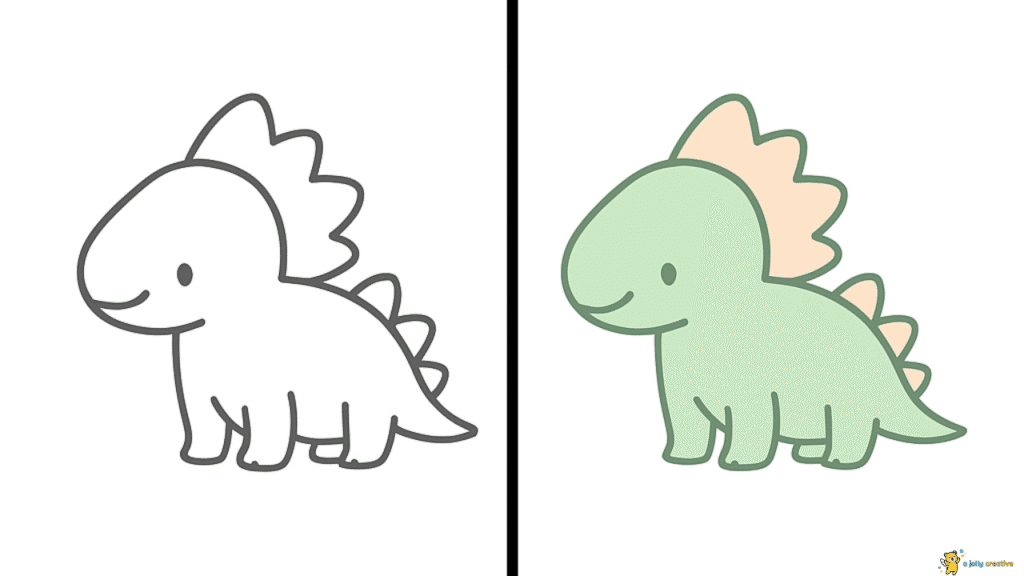
The Tryceratops offers excellent practice for symmetrical design and distinctive prehistoric features. Start with a large oval body and add the characteristic frill behind the head using a semi-circular shape.
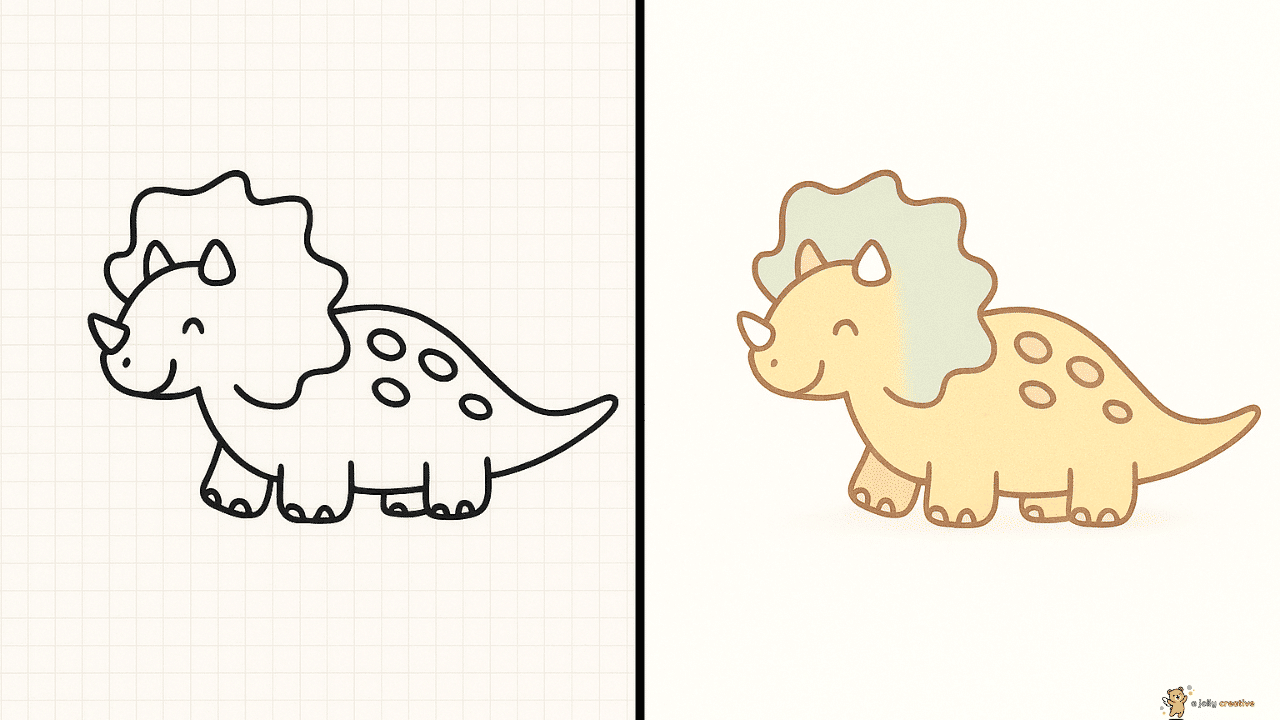
The three horns require careful placement – two longer ones above the eyes and one shorter horn positioned on the nose. Keep these horns rounded rather than sharp to maintain the cute aesthetic that makes these spiked dinosaurs approachable for young artists and viewers.
A Simple Flying Dinosaur
Flying reptiles like pterodactyls provide excellent opportunities for practicing wing anatomy and flight poses.
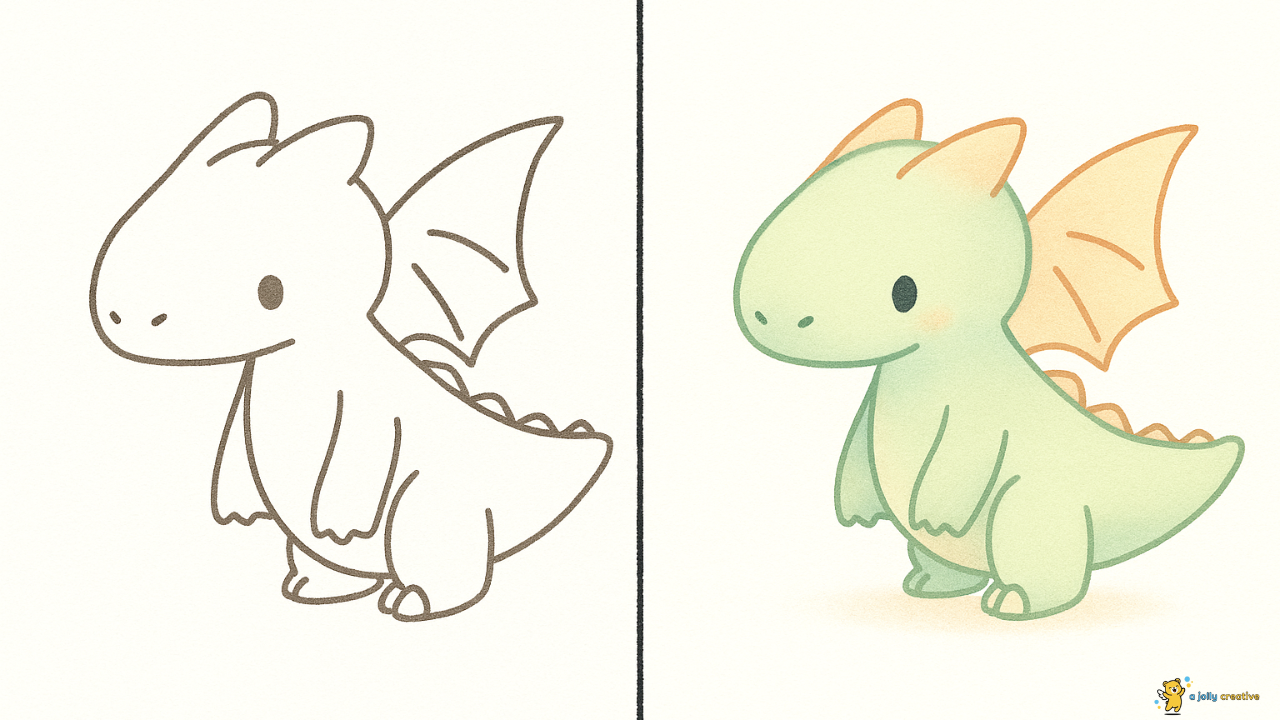
These aerial dinosaurs weren’t technically dinosaurs but are often included in dinosaur collections due to their prehistoric origins and popular appeal among young artists.
You may also like to read: 27 Cute & Easy Bunny Drawing Ideas
Simple Standing Dinosaur Looking Up
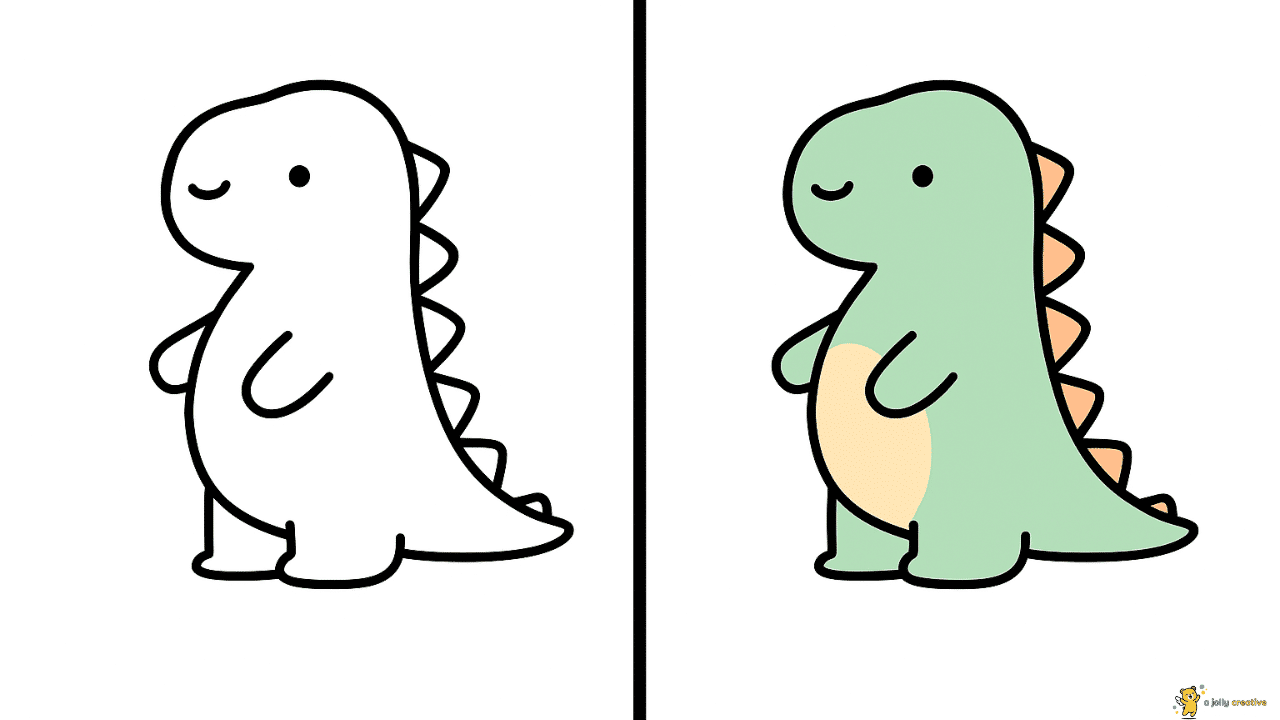
This pose captures wonder and contemplation while providing excellent practice for upward angles and neck positioning techniques. Begin with standard body shapes, then elongate the neck in a graceful upward curve that creates interesting proportional challenges for developing artists.
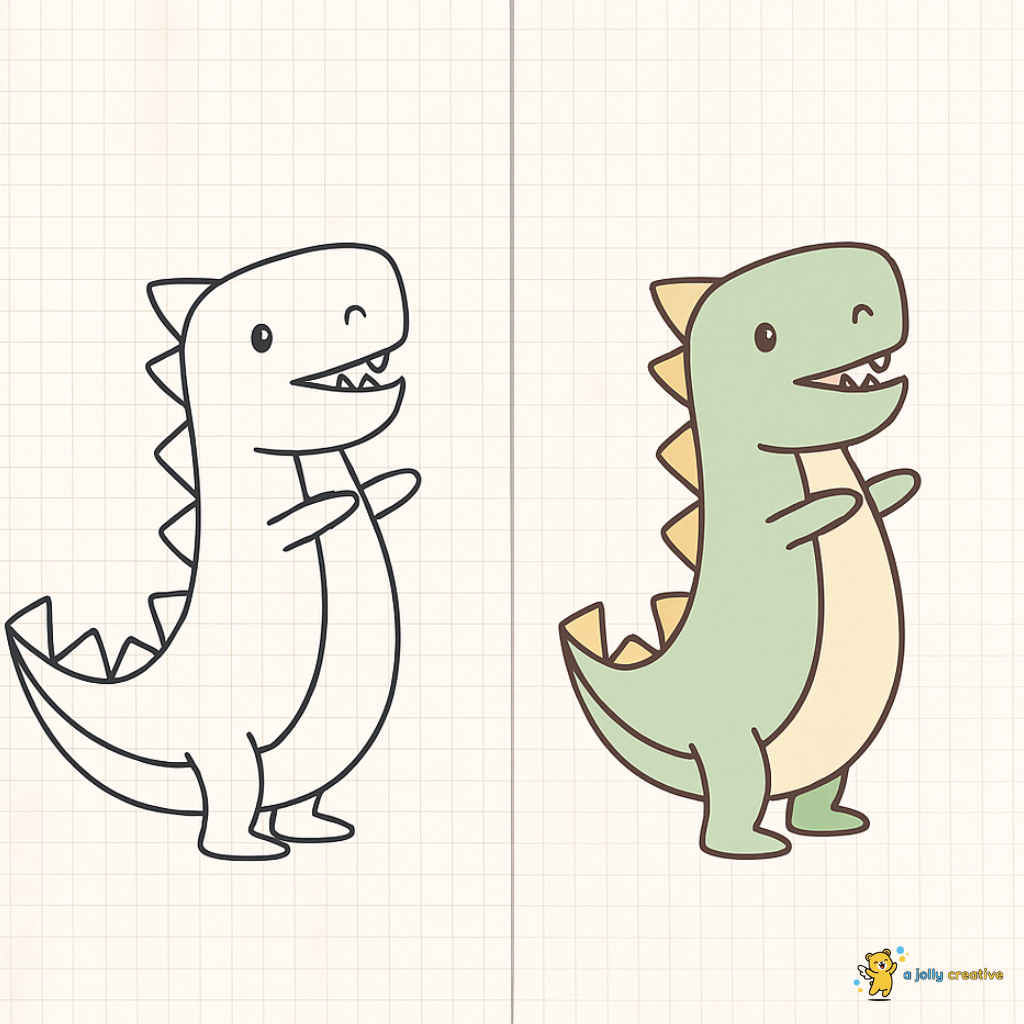
The head should tilt back naturally, with the eye line following the upward gaze direction. This detail ensures the pose appears natural rather than forced or anatomically incorrect.
Peaceful Dinosaur Looking at The Stars
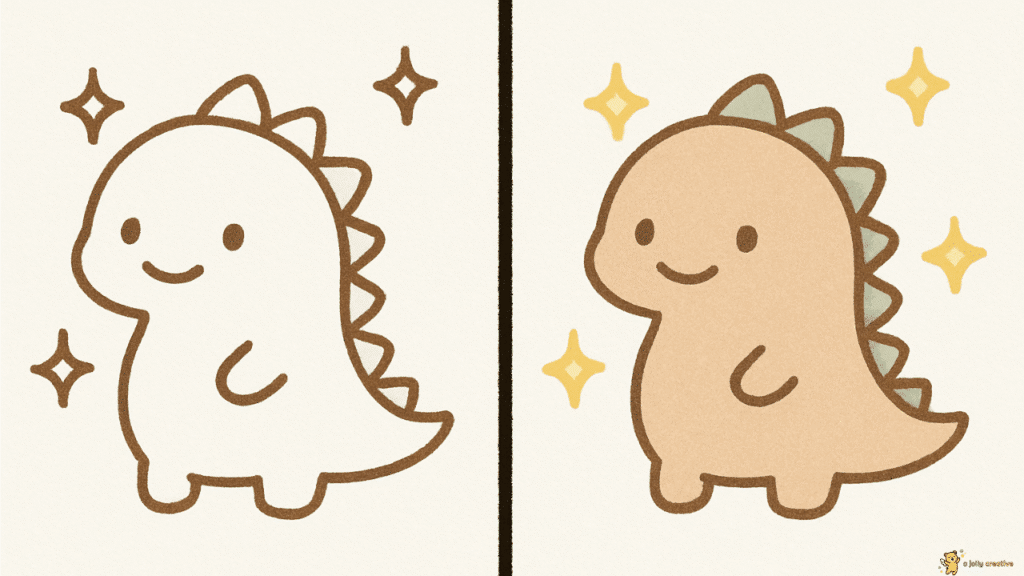
Night scenes expand artistic skills while creating magical atmospheres that appeal to viewers of all ages. Position the dinosaur with its neck extended upward, gazing at a starry prehistoric sky. This pose combines upward-looking techniques with environmental storytelling that engages imagination.
A Cute Gentle Stegosaurus
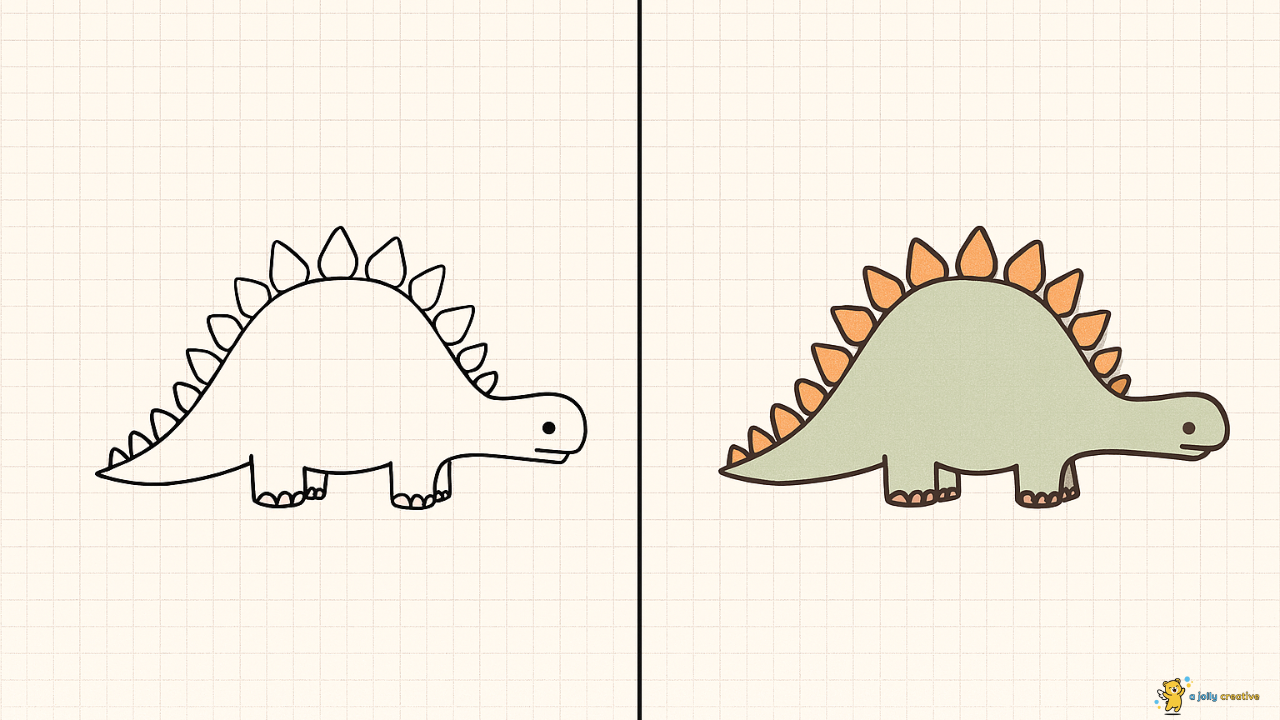
Stegosaurus ranks among the most recognizable spiked dinosaurs due to its distinctive back plates and tail spikes.
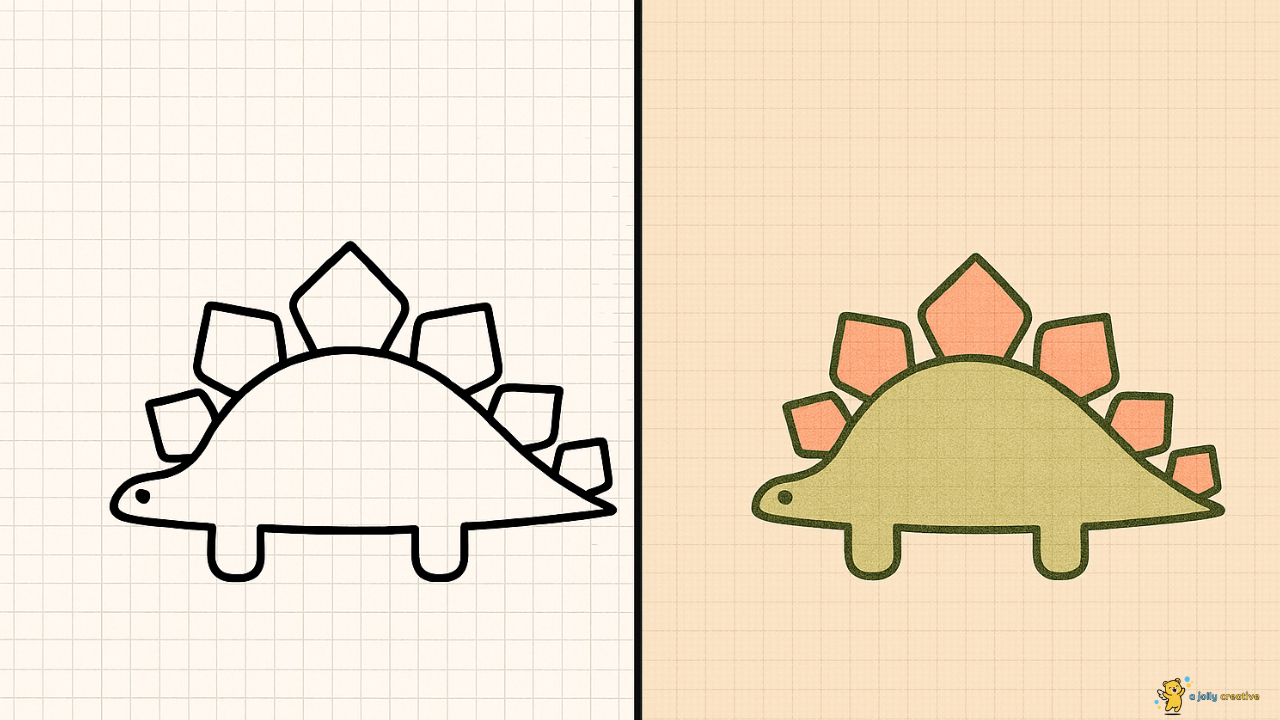
These herbivorous species provide excellent practice for repetitive patterns and defensive features rendered in friendly, approachable styles suitable for young artists.
A Simple Flying Pterodactyl
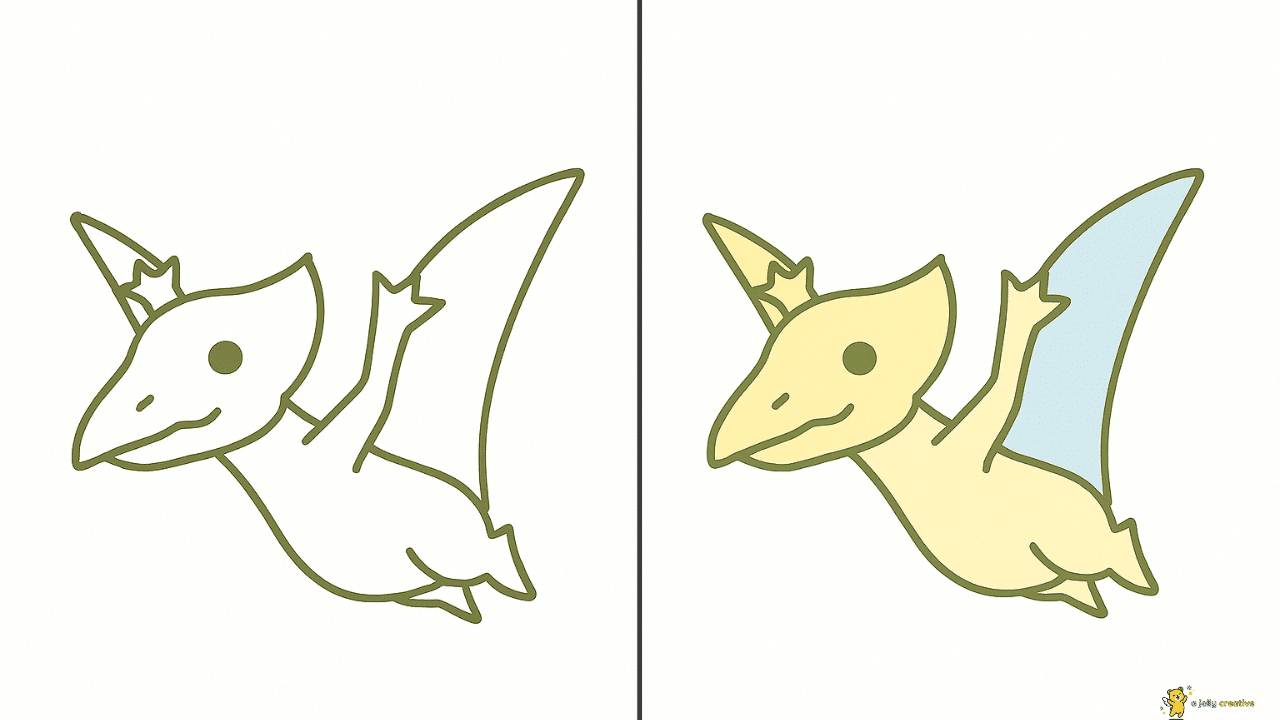
Dynamic flight poses challenge artists to convey motion and energy through static drawings. Position the wings in different angles to suggest active flying rather than passive gliding, requiring understanding of how wings move during different phases of flight cycles.
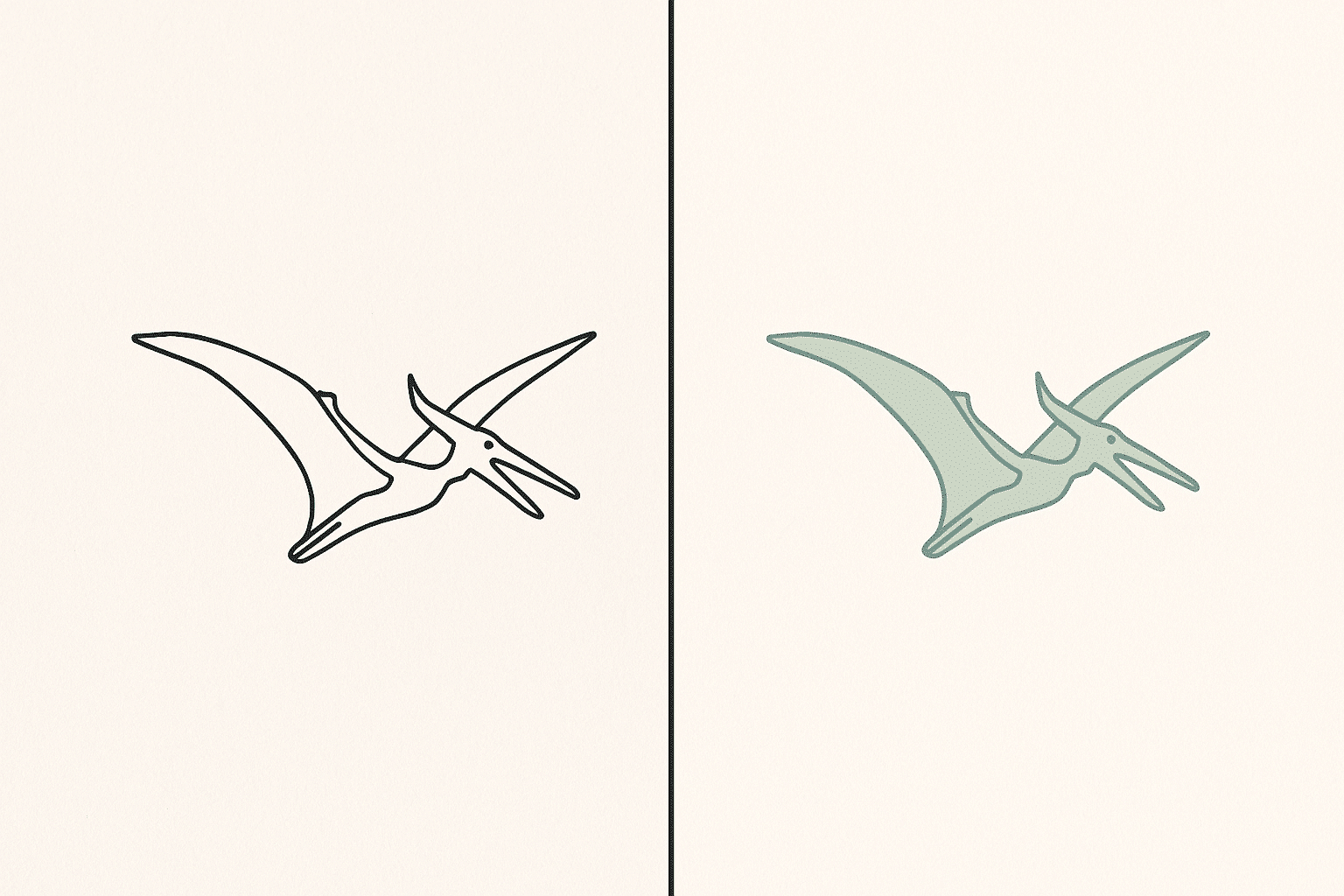
Add motion lines behind the pterodactyl to emphasize speed and directional movement through the prehistoric atmosphere. Cloud shapes in the background can enhance the aerial environment while providing practice with different textures and atmospheric perspective techniques.
If you’re interested, check out: 35+ Easy Hamster Drawing Ideas for Beginners
A Fun Cooking Dinosaur
Whimsical scenarios like cooking dinosaurs encourage creativity and humor in artistic expression.
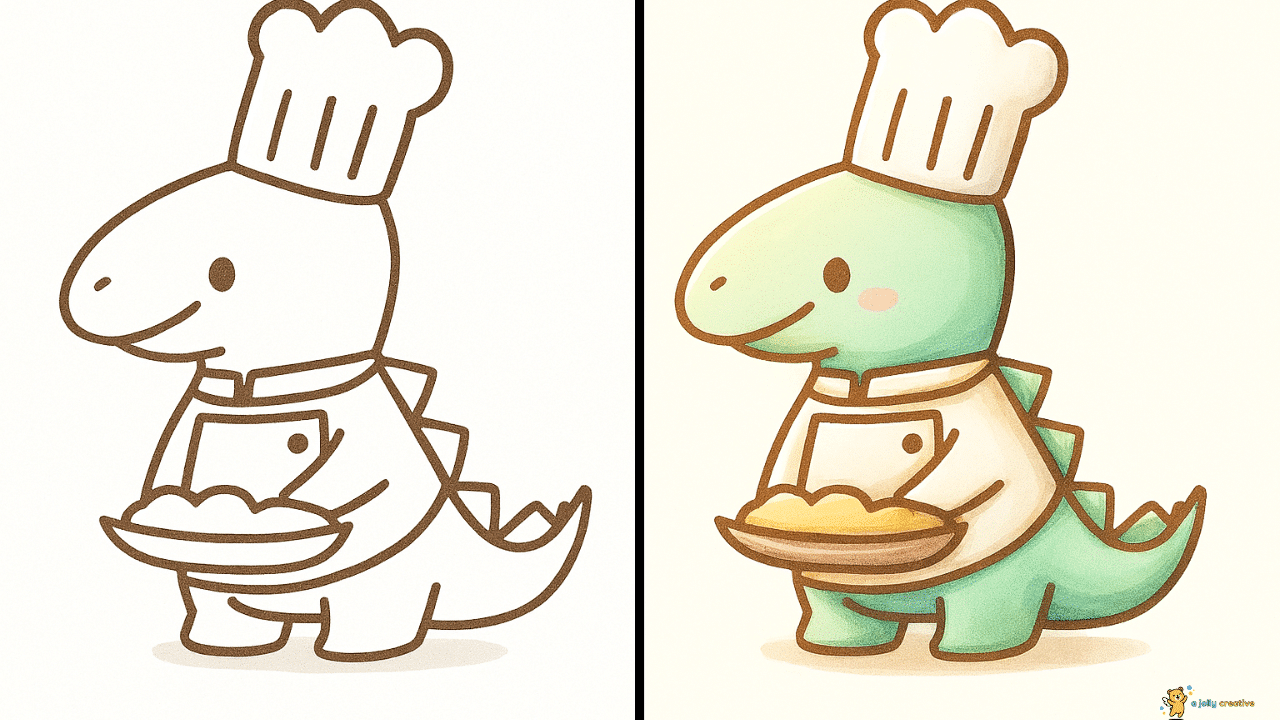
Consider what cooking utensils a dinosaur might hold – perhaps oversized spoons or mixing bowls that accommodate their size and claw structure. These props should be proportioned appropriately for the dinosaur’s hands while maintaining believability within the humorous context.
A Gentle Sweet Brachiosaurus
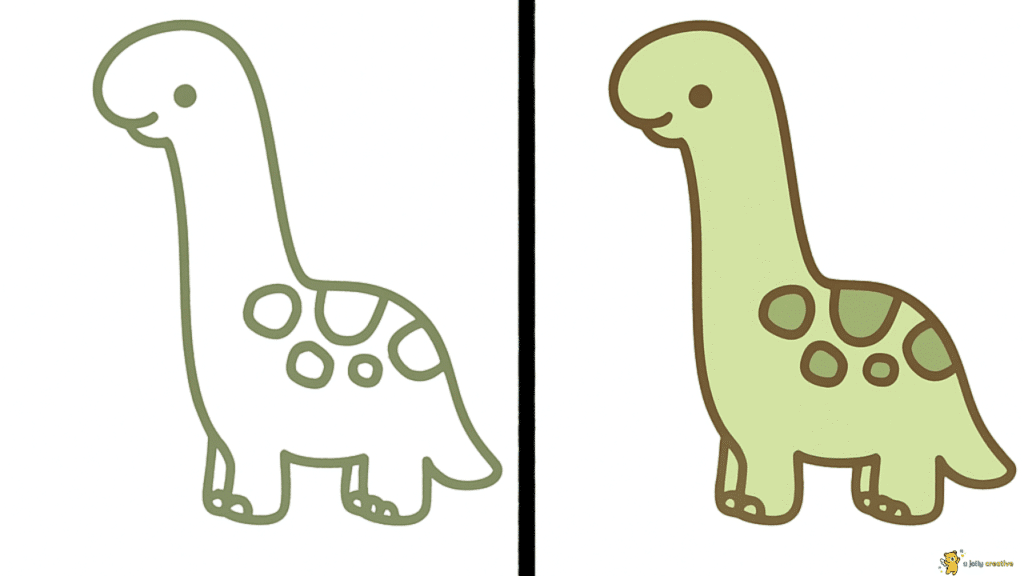
Brachiosaurus exemplifies the gentle giants category with its impressive long neck and peaceful demeanor. These massive creatures were plant-eating dinosaurs that reached incredible heights, making them perfect subjects for practicing proportion relationships and scale considerations in artistic compositions.
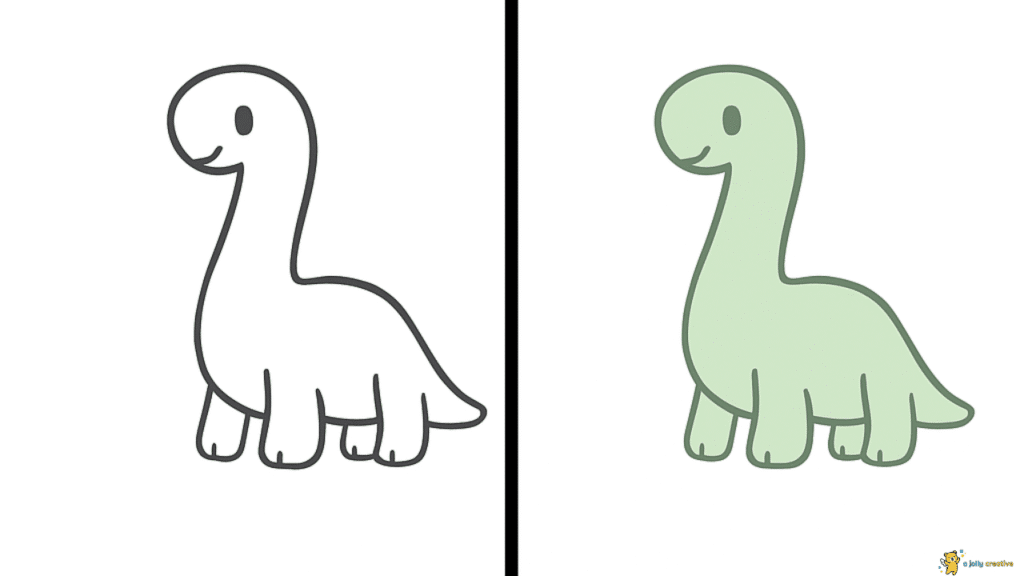
Begin with a large oval body, then add the distinctive long neck using a curved cylinder shape that suggests both strength and grace.
A Cute Friendly Parasaurolophus
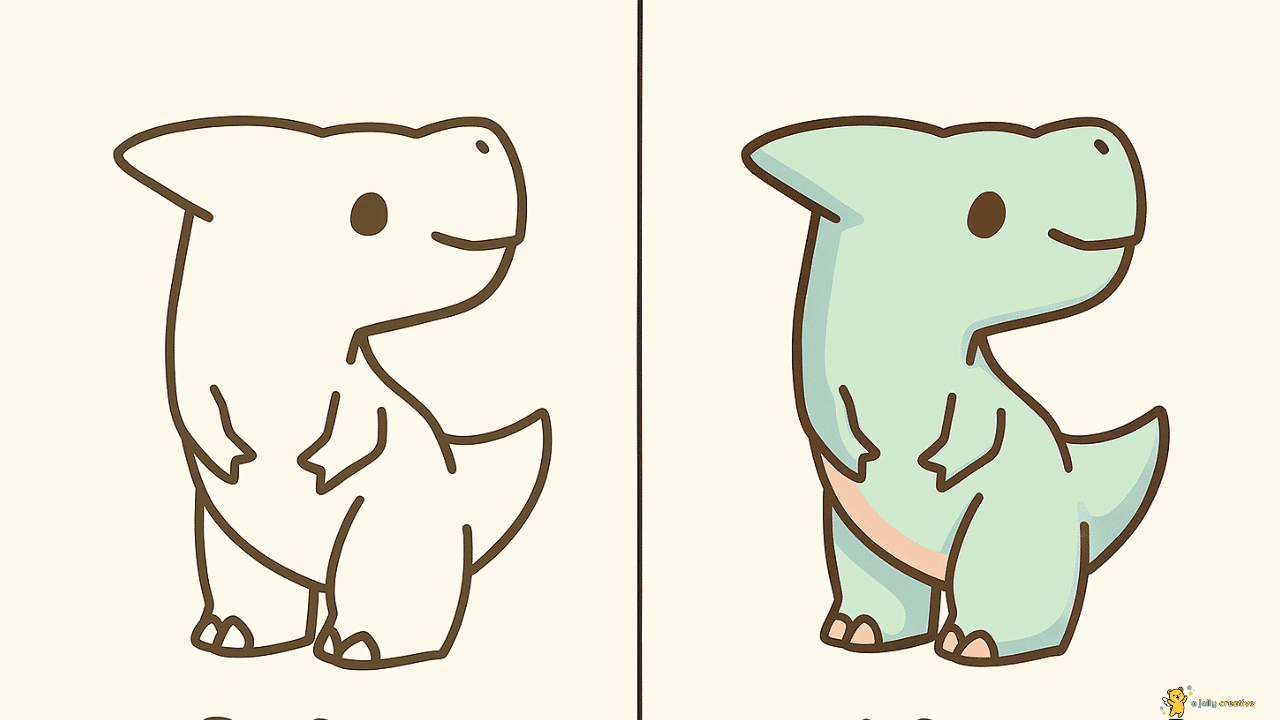
Parasaurolophus featured distinctive head crests that functioned as sound chambers for communication. These lesser-known dinosaurs offer practice with unique anatomical features while introducing educational elements about dinosaur social behavior and prehistoric ecosystems.
A Simple Easy Pterodactyl
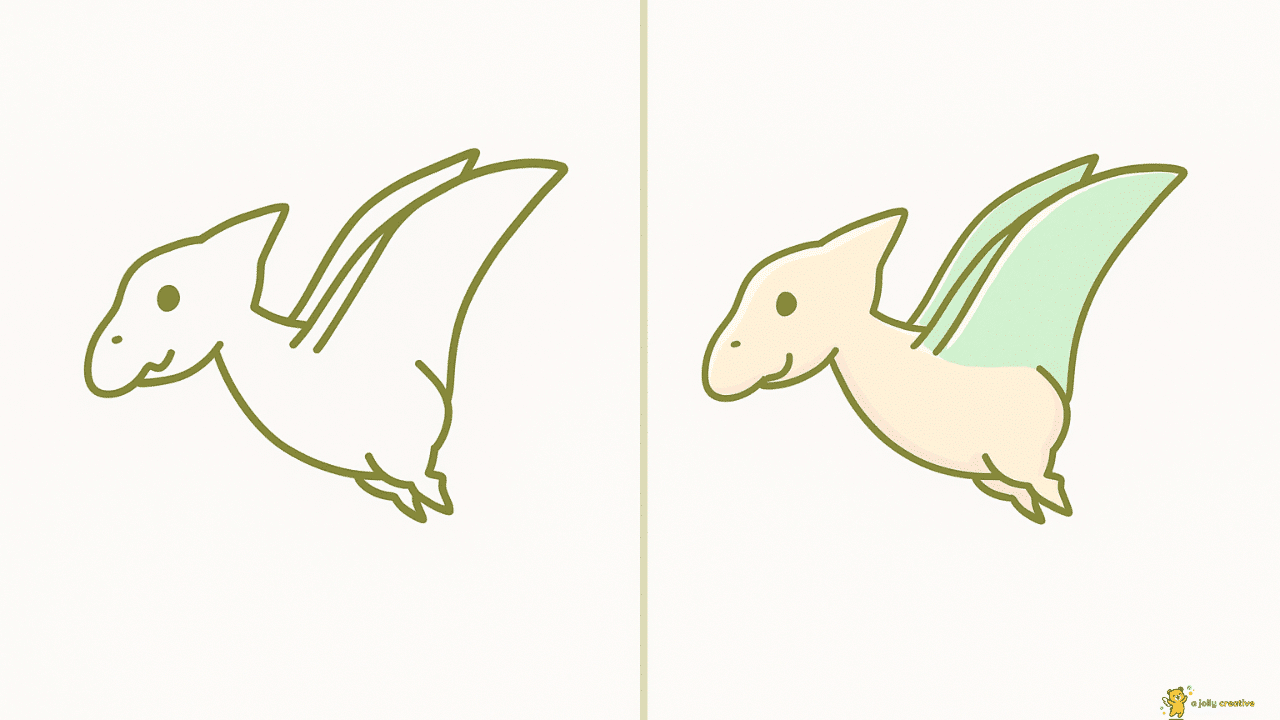
Pterodactyls were flying reptiles that lived alongside dinosaurs during prehistoric periods. These creatures provide excellent wing practice and introduce concepts of flight mechanics and anatomical adaptations for aerial life in ancient ecosystems.
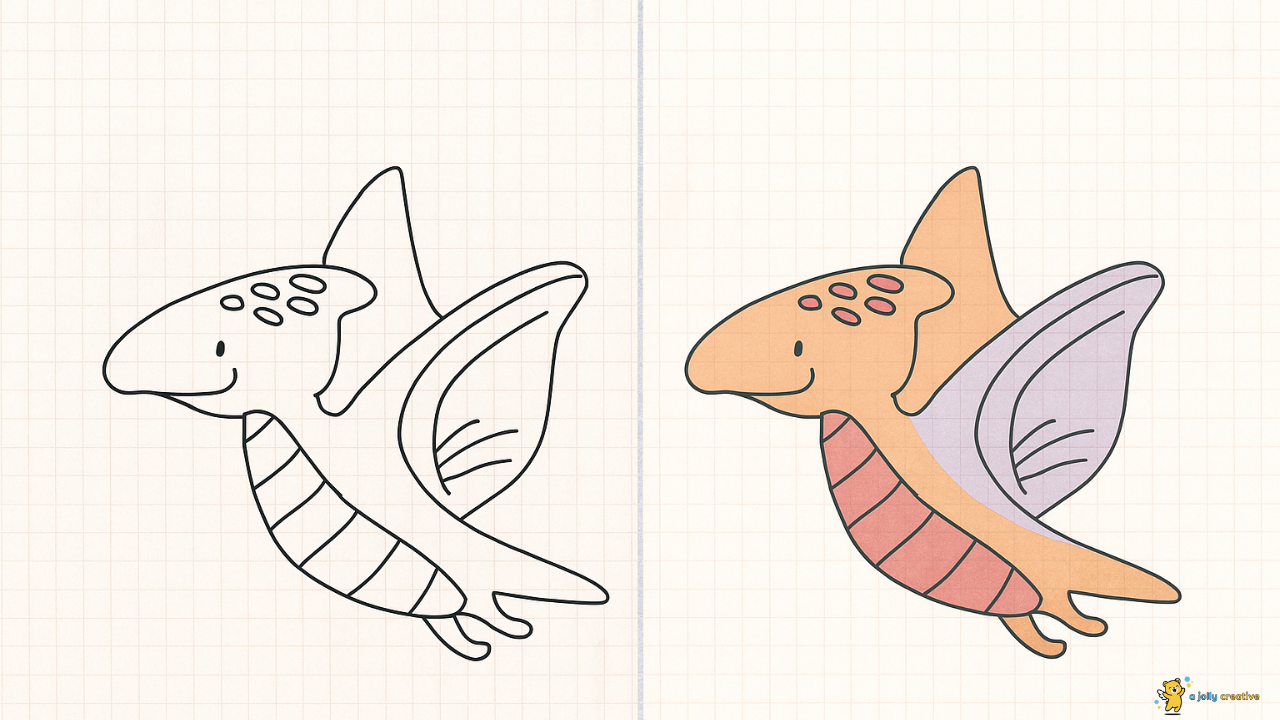
Start with a small, lightweight body since pterodactyls needed reduced weight for successful flight capabilities. The wings are the defining feature – begin with basic triangular shapes, then develop into more realistic wing membranes that show understanding of flight anatomy.
A Joyful Dancing Dinosaur
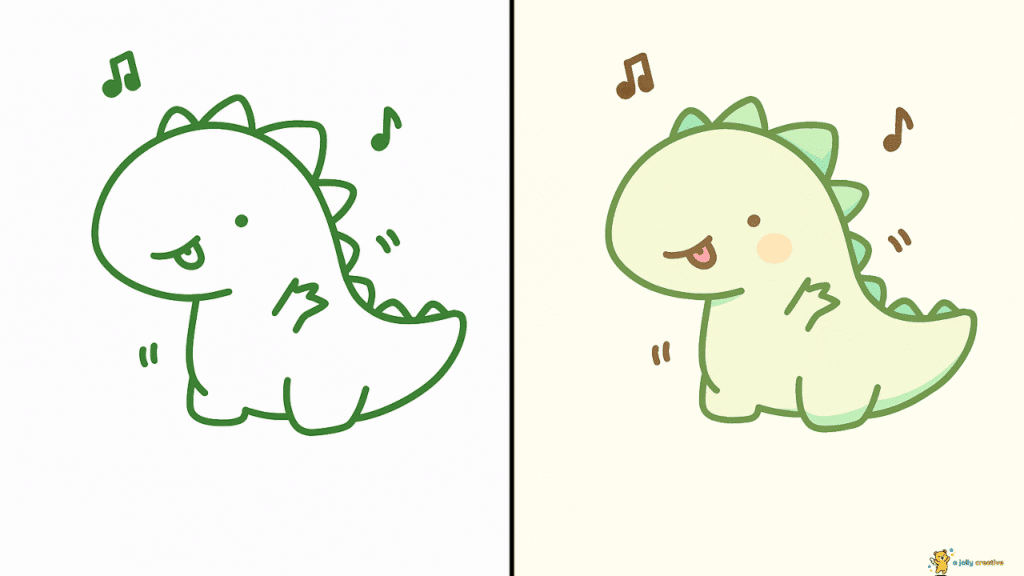
A dancing dinosaur showcases artistic freedom while practicing more challenging body positions that require understanding of balance and weight distribution principles.
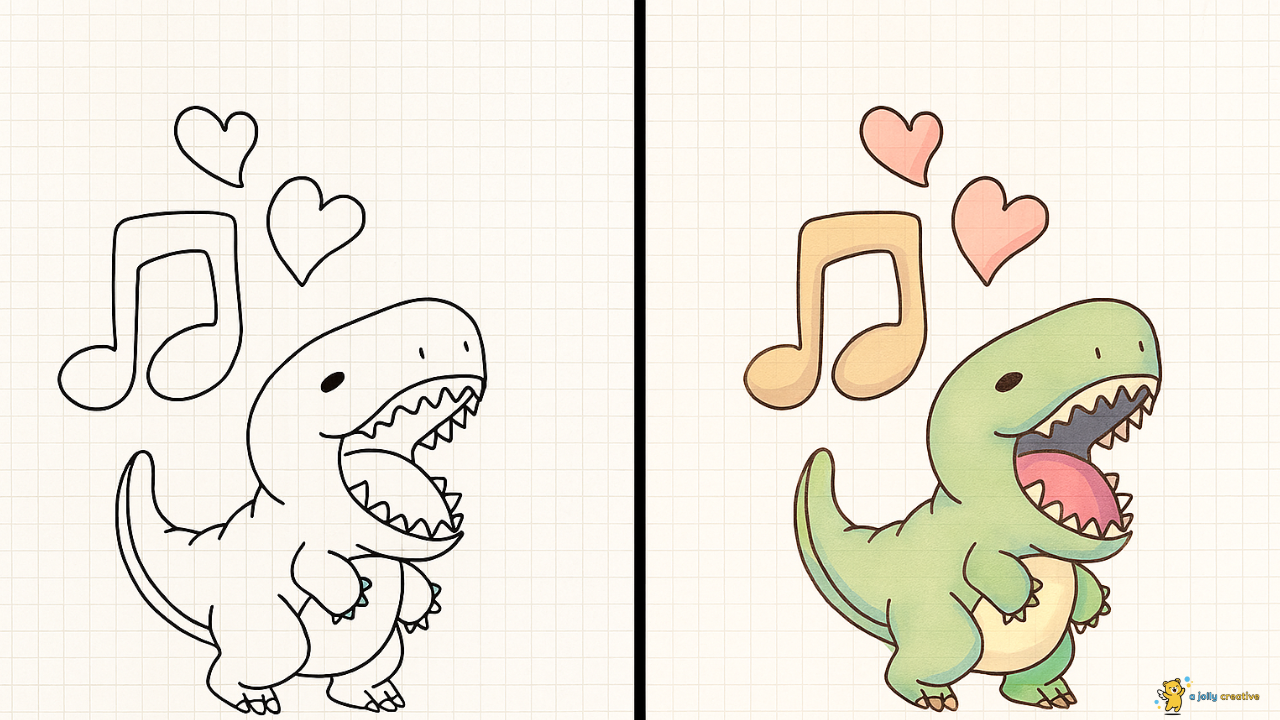
Raise one leg and tilt the body slightly to create visual balance and suggest rhythmic movement. Arms can be positioned expressively – perhaps raised in celebration or extended for balance during the dance pose. This positioning requires understanding weight distribution concepts.
A Cute Parasaurolophus with Wings
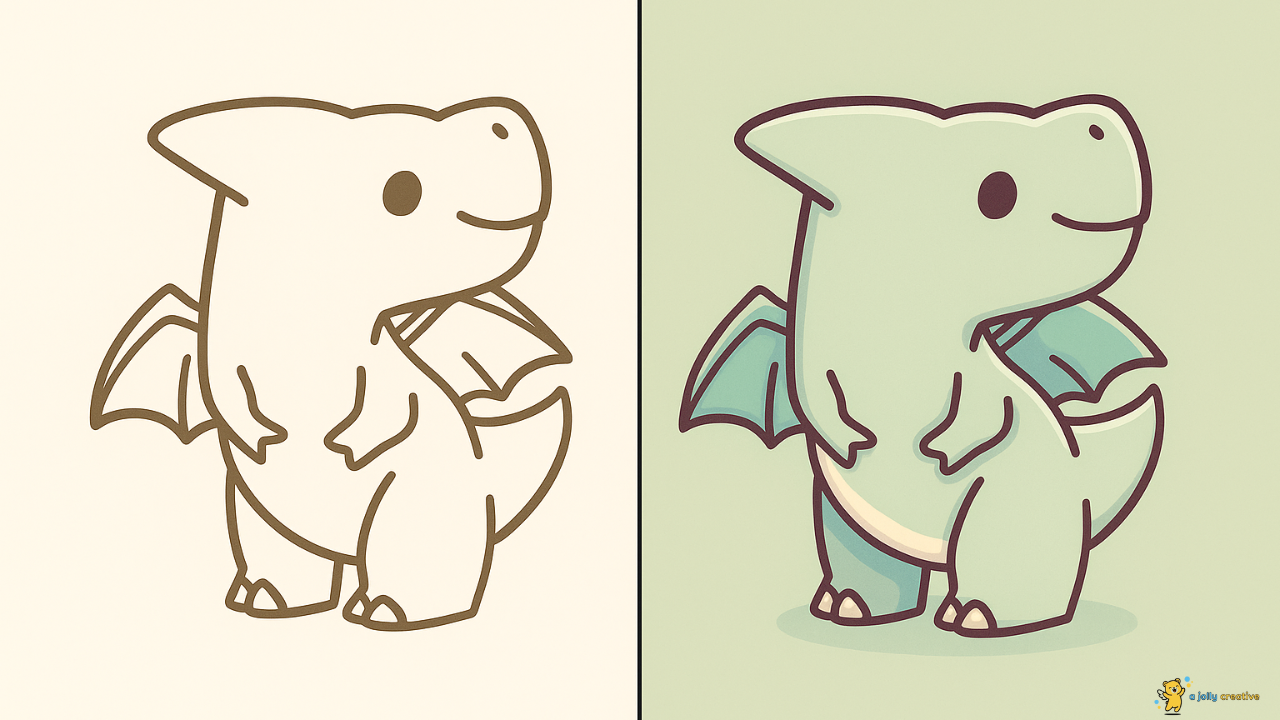
Fantasy variations encourage imagination and creative freedom beyond strict scientific accuracy. Adding wings to land-dwelling dinosaurs creates magical creatures that appeal especially to young artists who love fantastical subjects and mythical creature combinations.
You might find this interesting: 35+ Easy Duck Drawing Ideas
Coelophysis
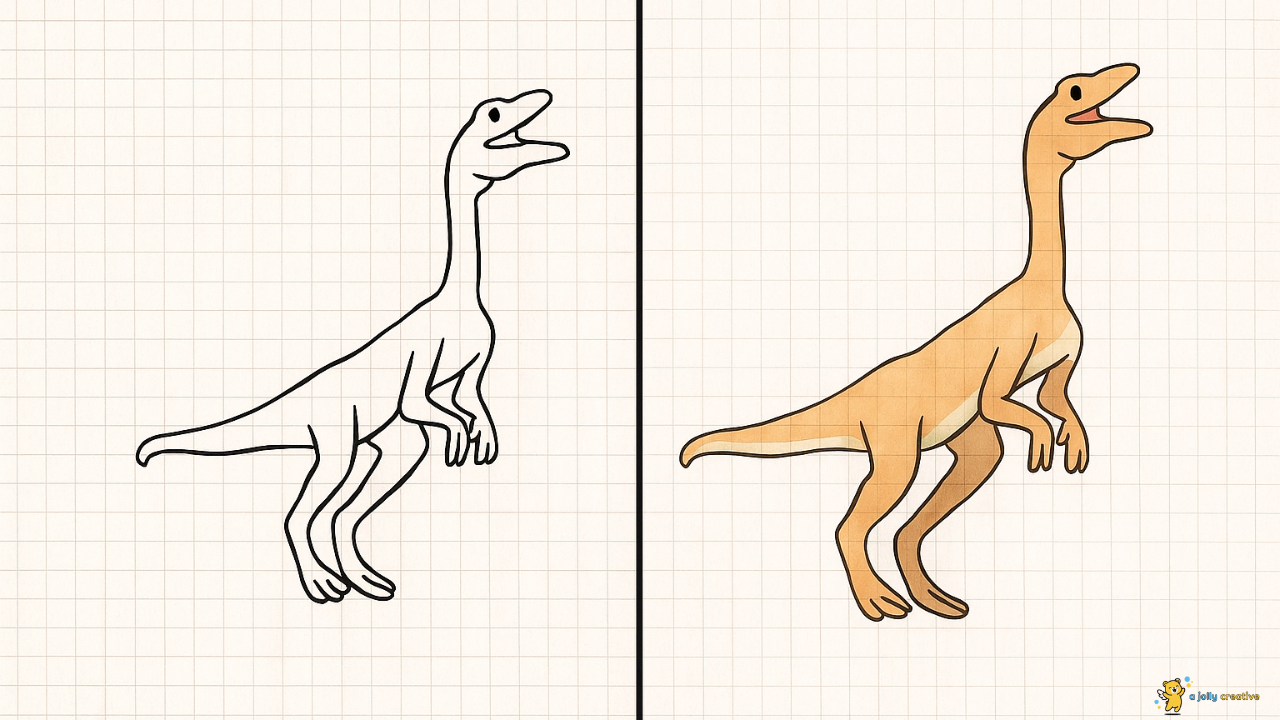
Coelophysis represents one of the earliest dinosaurs discovered, providing opportunities to discuss dinosaur evolution and prehistoric diversity. These slender dinosaurs moved in cooperative packs, making them perfect subjects for group drawings or family scenes that demonstrate social behavior.
A Swimming Dinosaur
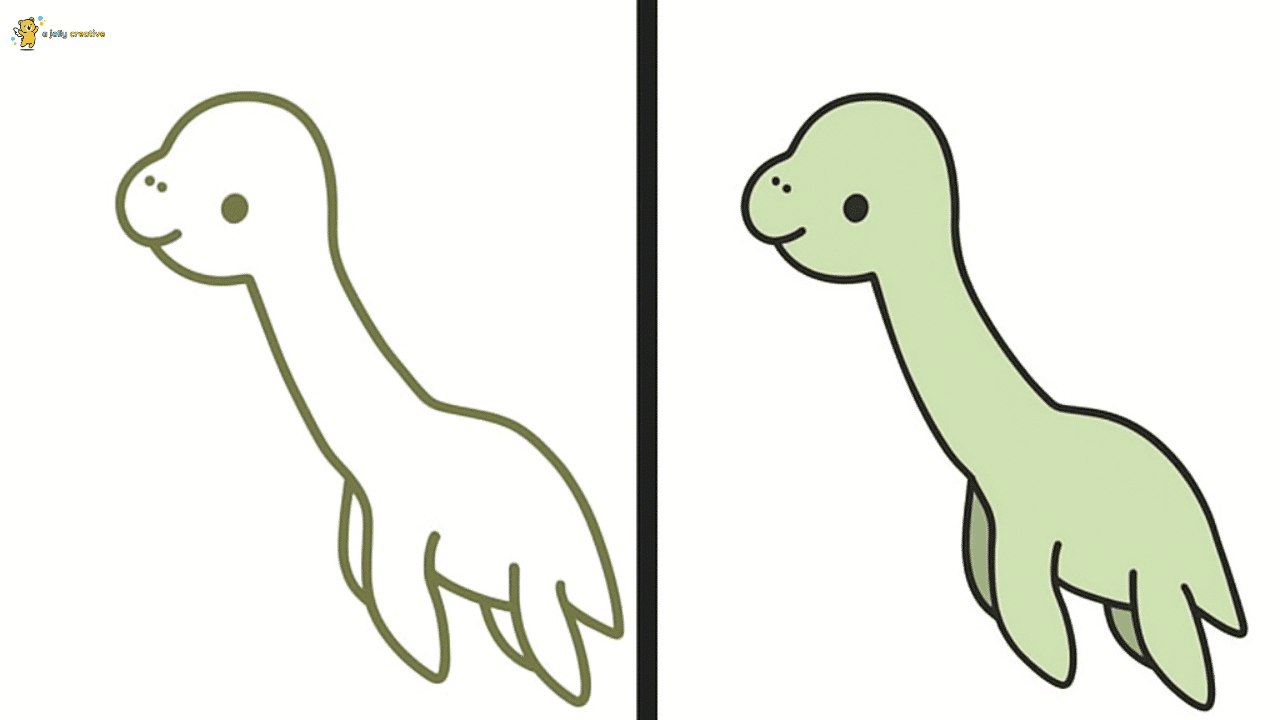
Aquatic scenes introduce new challenges like water effects and swimming poses that expand artistic skill sets. Some dinosaurs were excellent swimmers, making this a factually accurate drawing idea that combines education with artistic technique development.
A Ferocious Dinosaur
Balancing intimidation with approachability challenges artists to convey multiple emotions simultaneously within single character designs.
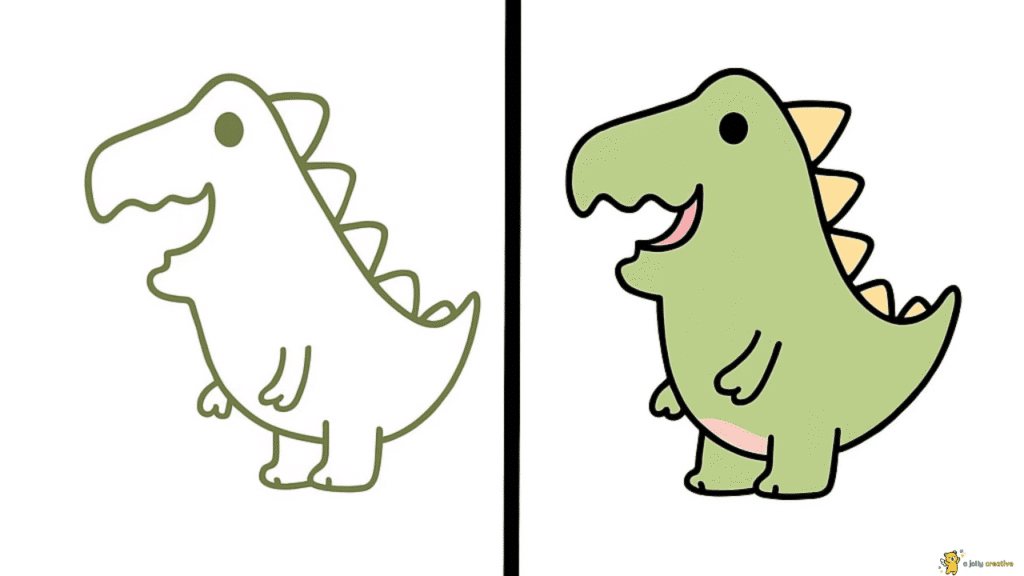
Cartoon-style exaggeration helps achieve this delicate balance – oversized eyes, rounded features, and playful poses can offset traditionally scary elements. The key lies in maintaining personality.
Parasaurolophus
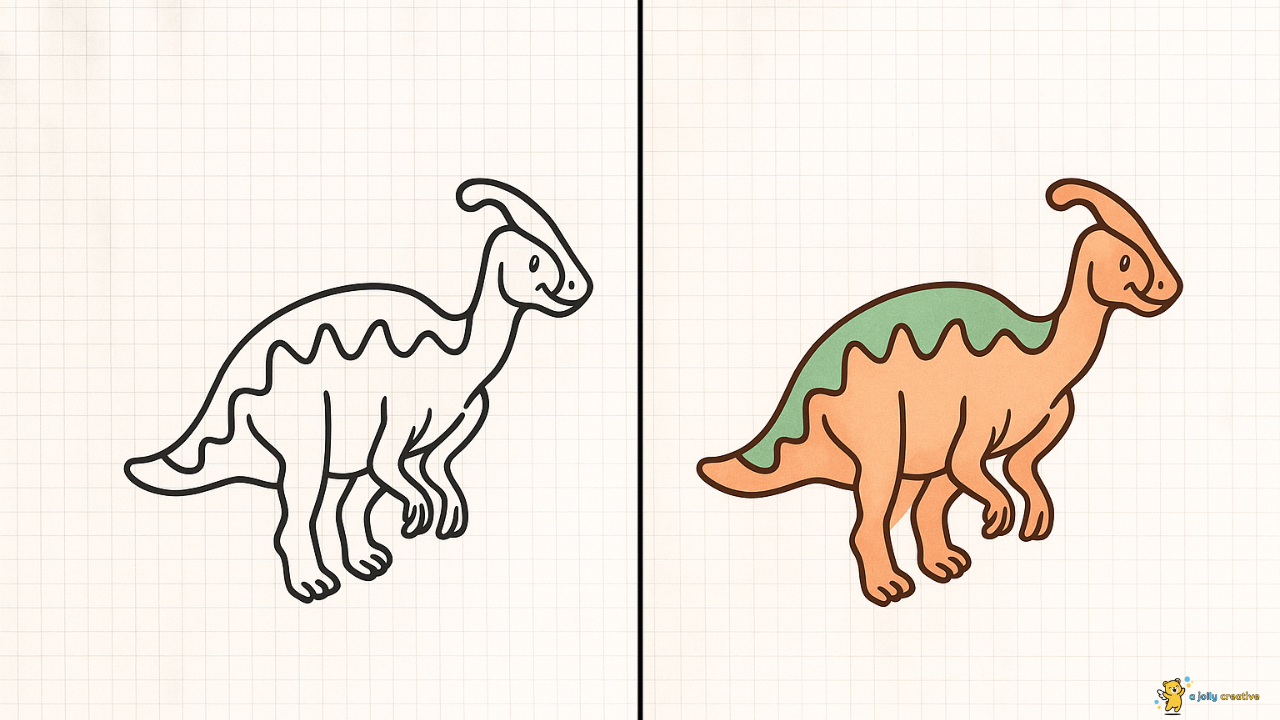
Scientific accuracy becomes important when creating educational dinosaur drawings that serve learning purposes. This version should reflect current paleontological understanding while maintaining artistic appeal that engages young learners and maintains their interest in prehistoric subjects.
Dinosaur Bones
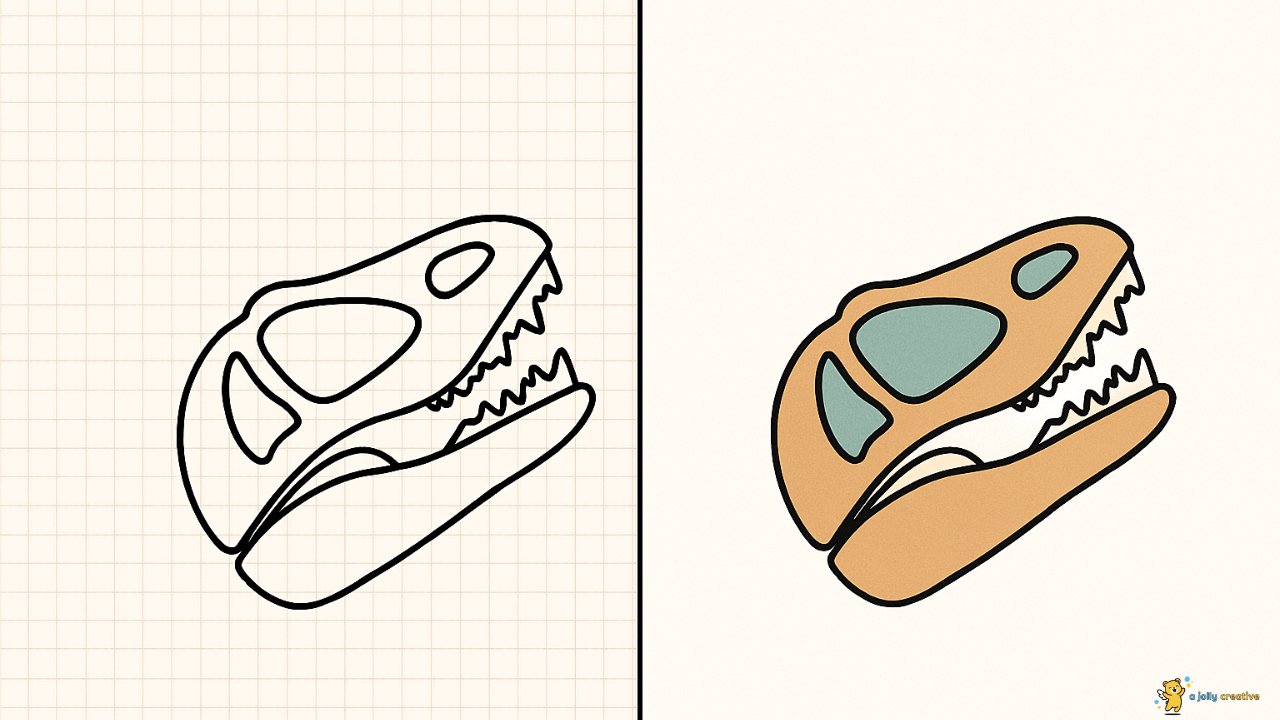
Skeleton illustrations introduce scientific drawing concepts while teaching about paleontological studies and fossil discovery processes.
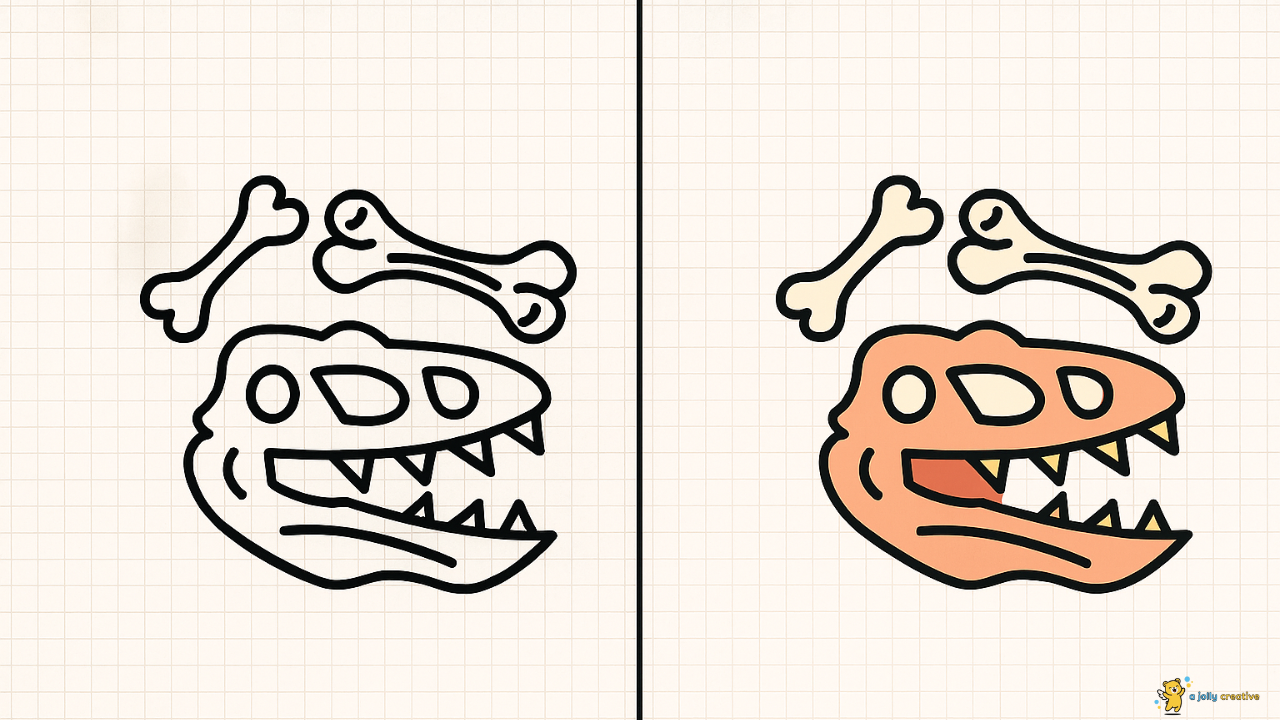
Museum display contexts provide realistic settings for fossil representation drawings that connect art with real-world scientific institutions. Add simple pedestals, information plaques, or background museum elements to create complete scenes rather than isolated bone studies without context.
A Playful Dinosaur
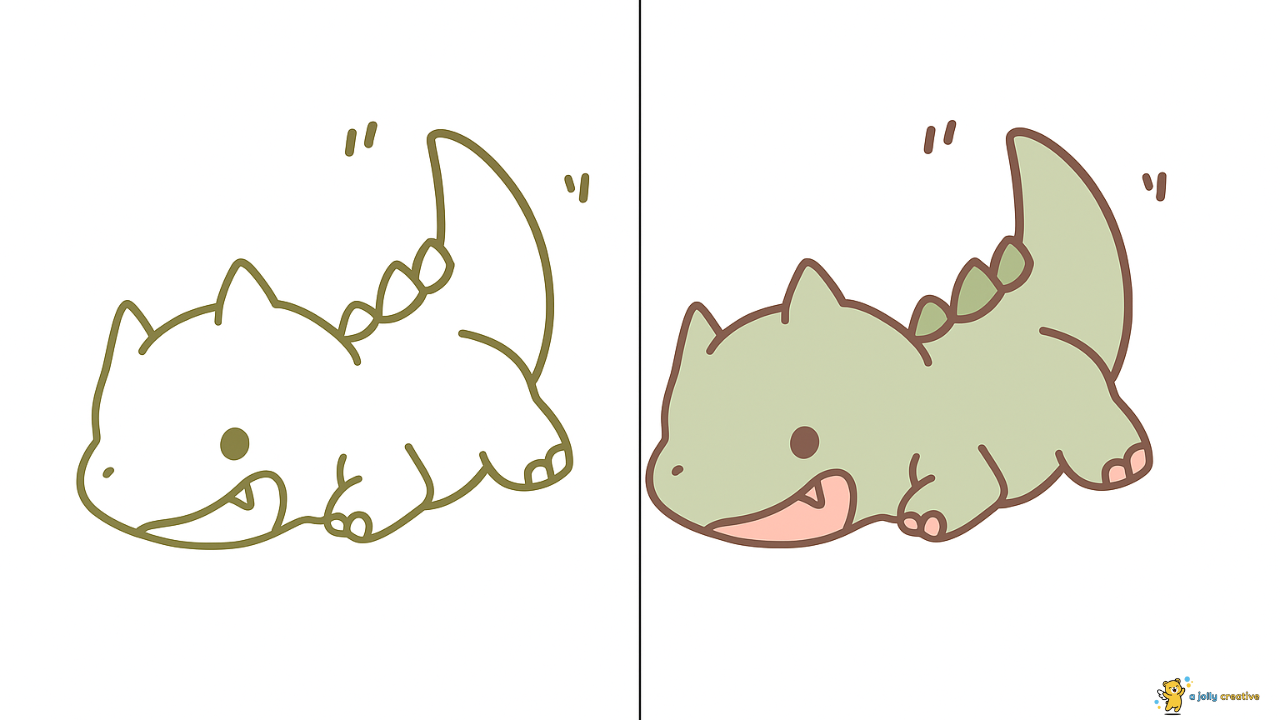
Playful poses and expressions create engaging characters that appeal especially to young children developing their own artistic interests. Consider actions like jumping, running, or interacting with toys or other dinosaurs in friendly, non-threatening ways that encourage positive associations with prehistoric subjects.
Continue on your article: 35+ Cute and Easy Bird Drawing Ideas
Another Cute Kind of Stegosaurus
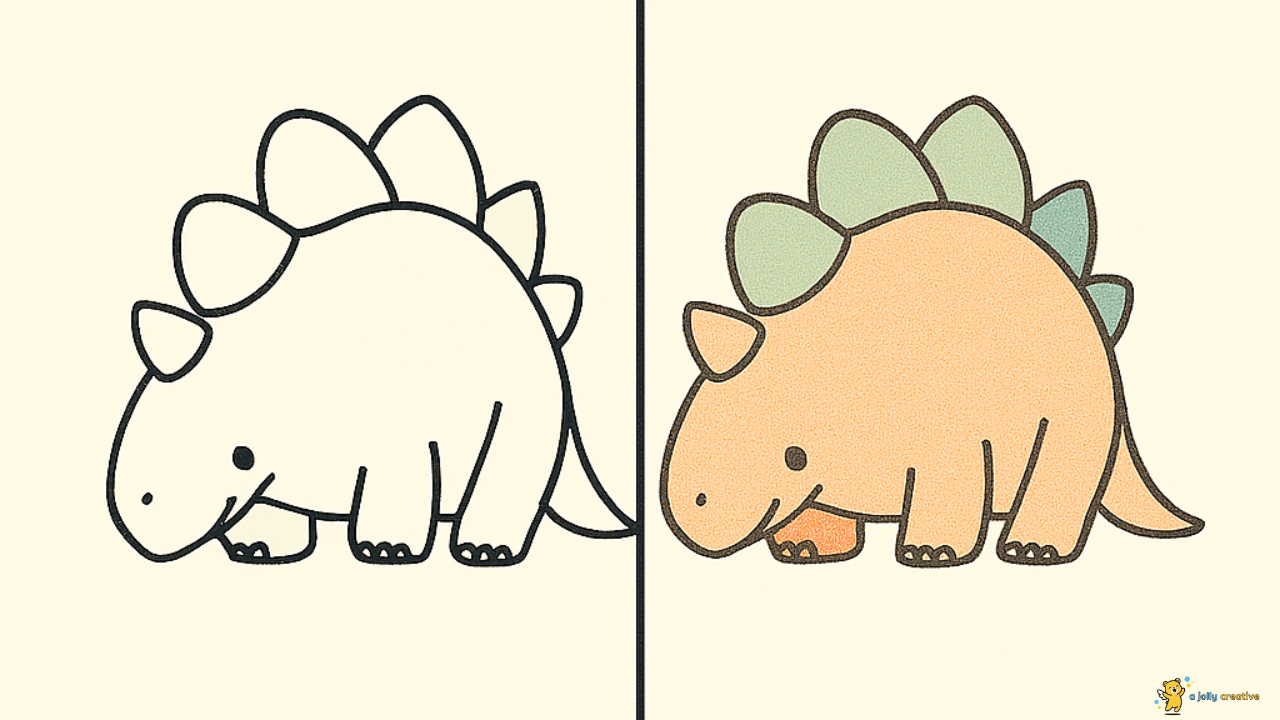
Variation practice develops artistic versatility through repetition with meaningful differences. This standing pose might feature a different species, alternative proportions, or varied personality expressions while maintaining basic structural elements that ensure anatomical believability.
Sleepy Dinosaur
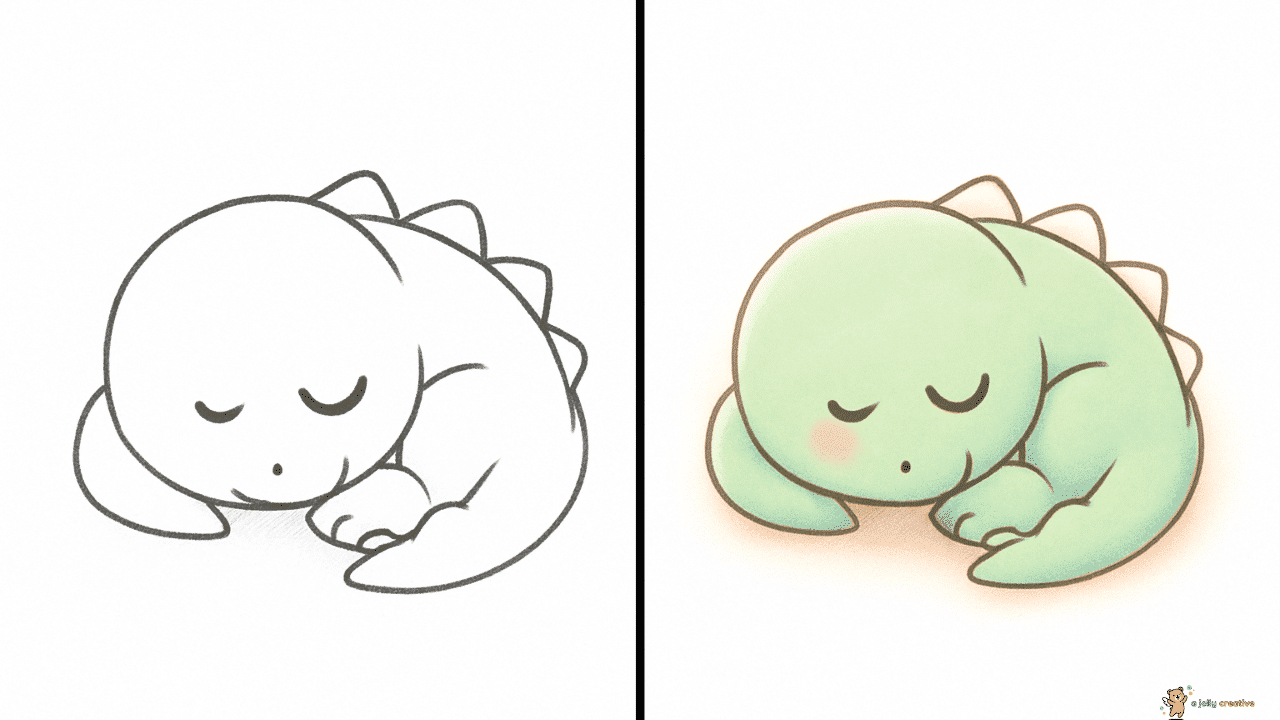
Peaceful sleep poses create gentle, appealing characters that especially attract young children and create positive associations with prehistoric subjects. Curled positions with closed eyes and completely relaxed expressions convey comfort and security rather than any prehistoric danger or threat.
A Giant Dinosaur
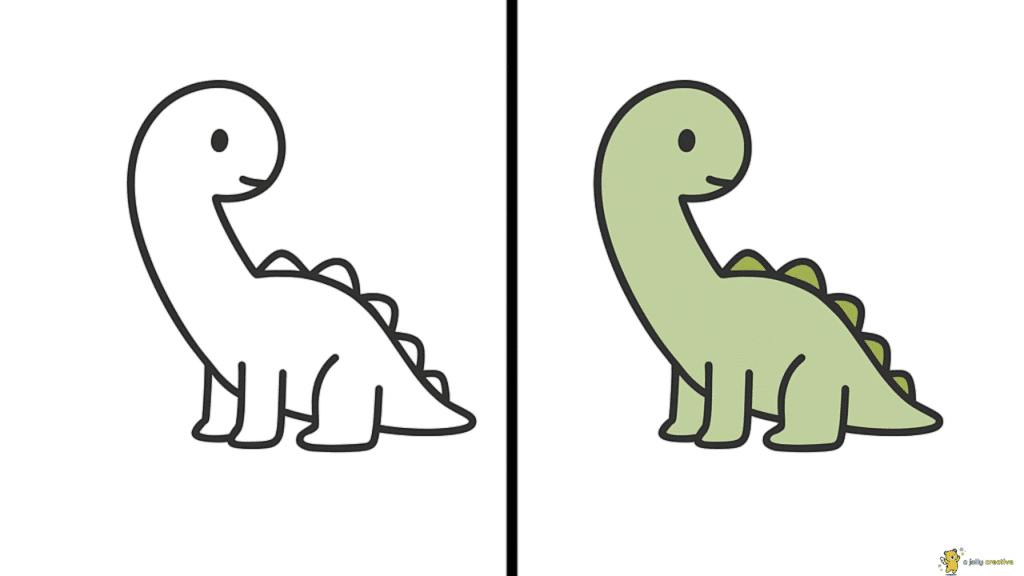
Scale comparison techniques help convey the massive size of the largest dinosaur species that ever lived. These gentle giants reached lengths exceeding 100 feet and weights of 80 tons, making them among the largest land animals ever discovered by paleontologists.
Baby Dino in its Egg
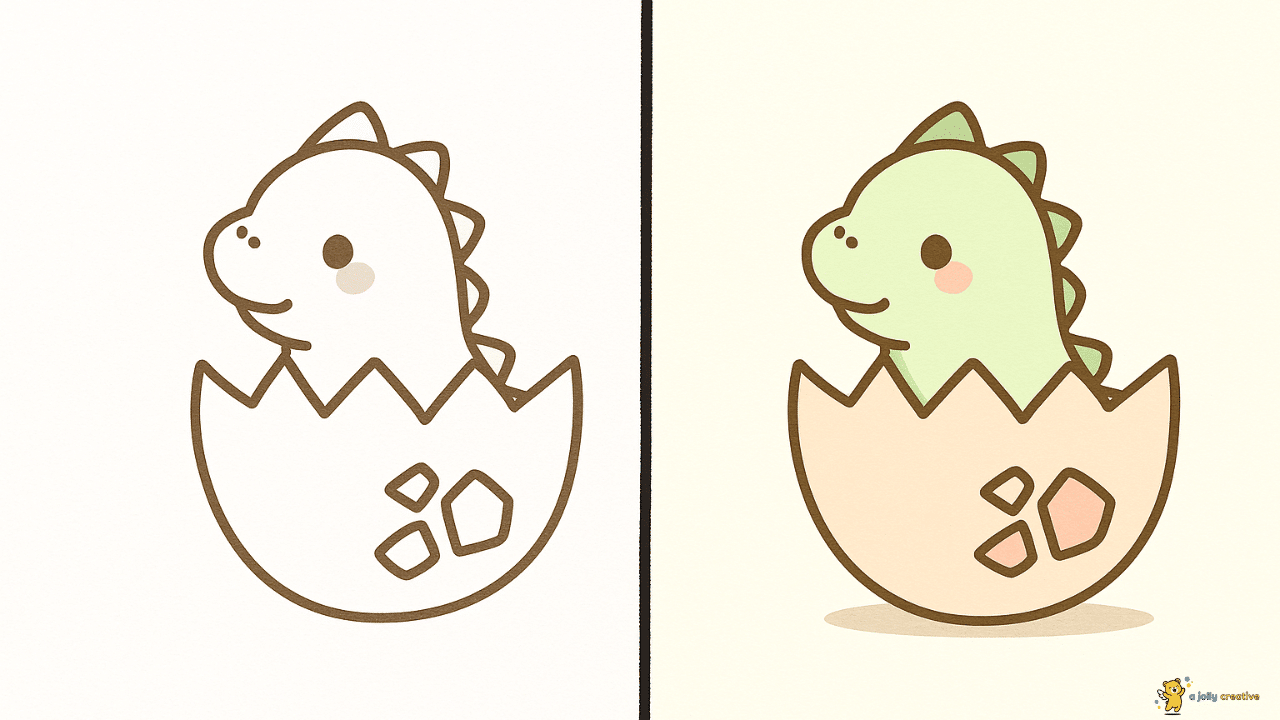
This drawing idea tells a story while practicing curved lines and texture work. Start with an egg shape, then add jagged cracks around the middle section. The emerging baby dinosaur should peek out with just its head and perhaps one tiny arm visible to viewers.
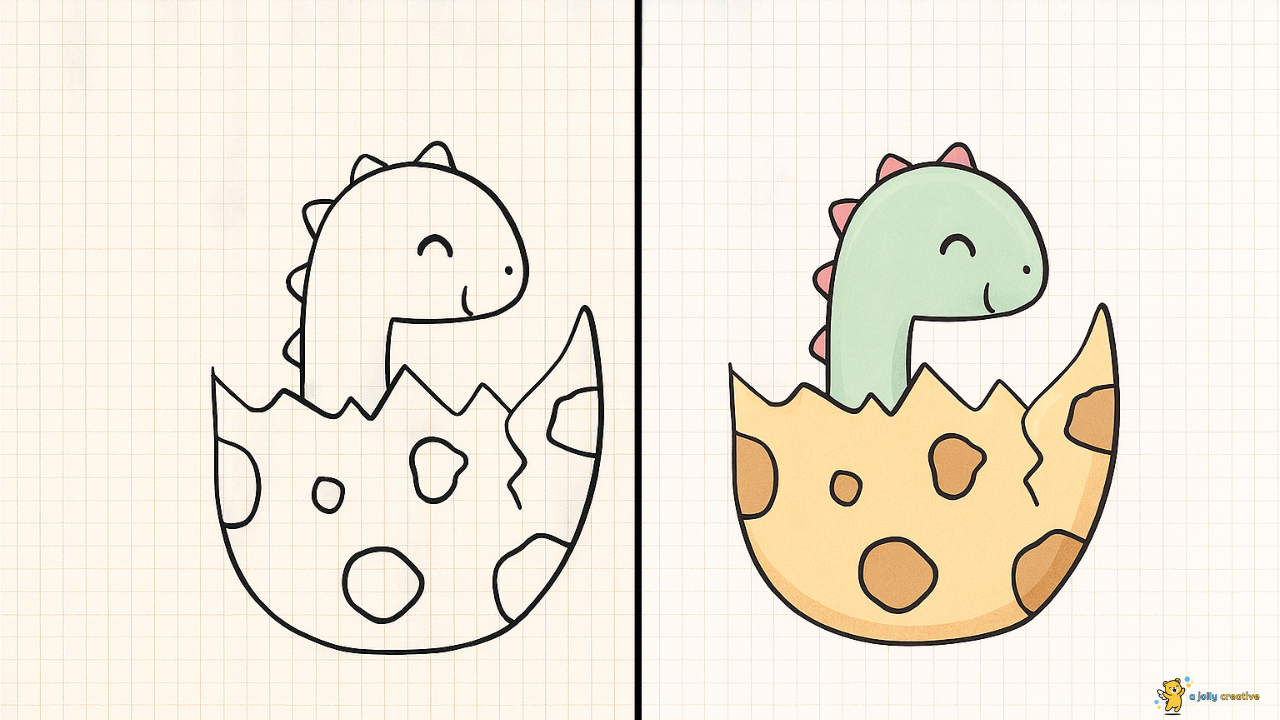
Focus on the contrast between the smooth egg surface and the textured crack lines that suggest the hatching process. This technique introduces basic shading concepts without requiring advanced artistic skills, making it accessible for beginning artists of all ages.
Dinosaur Family Group
Group compositions challenge artists to create believable relationships between multiple characters while maintaining individual personalities within family units.
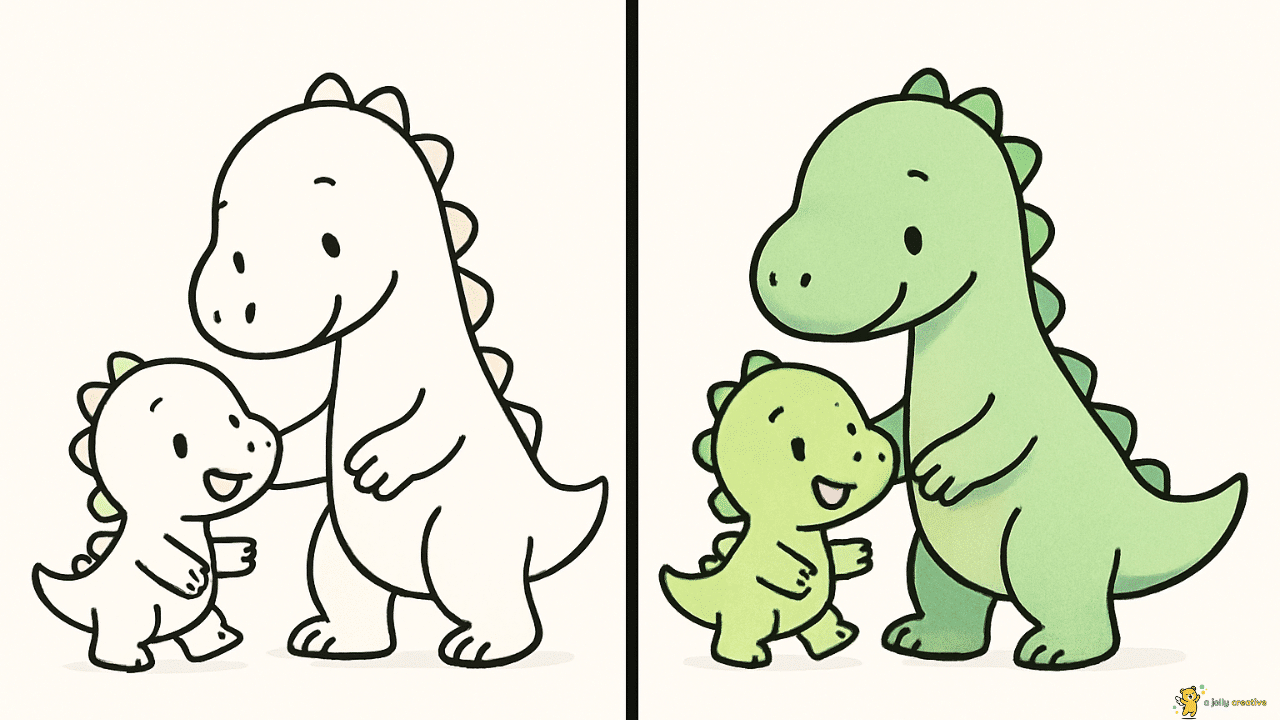
Size variations within families provide natural opportunities for practicing scale relationships and proportional accuracy.
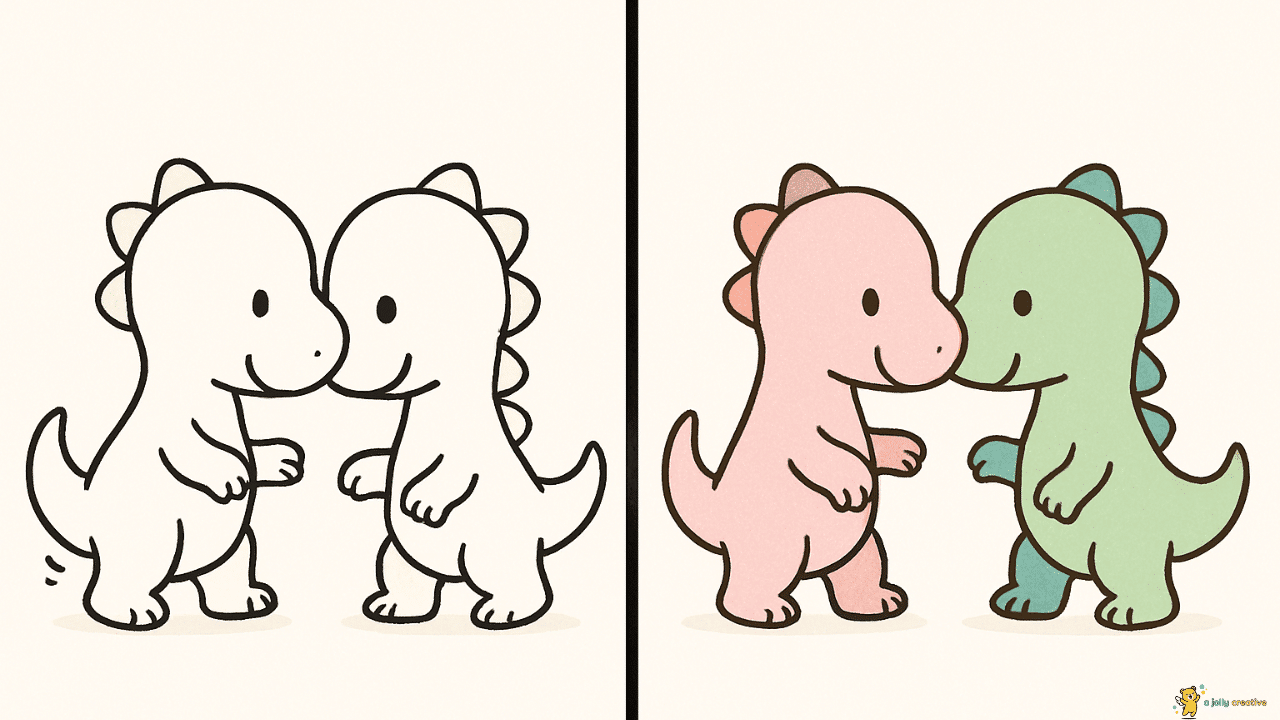
Interactive poses between family members tell stories without requiring words or extensive background detail. Perhaps a parent is teaching a baby to walk, or siblings are playing together peacefully. These scenarios create engaging family themes that resonate emotionally with viewers of all ages.
Cartoon-Style Dino
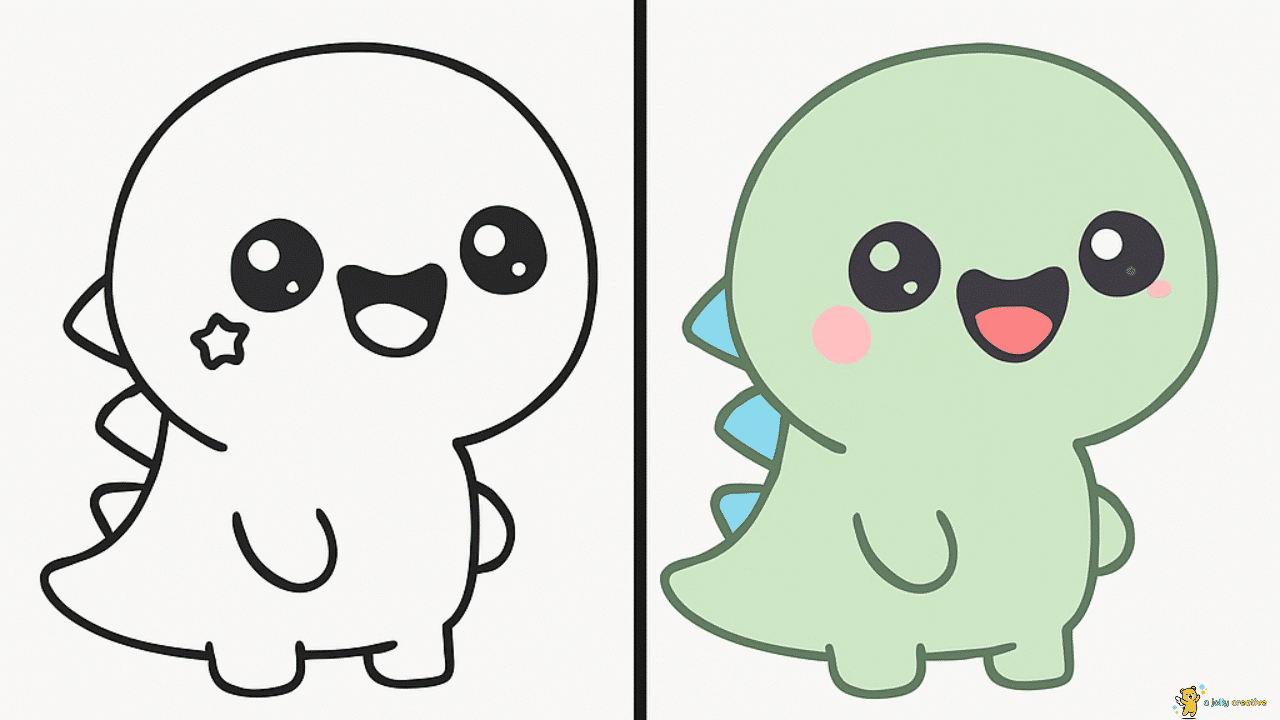
Extreme stylization pushes artistic boundaries through deliberate exaggeration and impossible proportions that prioritize appeal over scientific accuracy.
Maximum cuteness becomes the primary design goal, achieved through proven techniques like oversized heads, shortened limbs, and extremely expressive facial features.
A Simple Standing Dinosaur Drawing
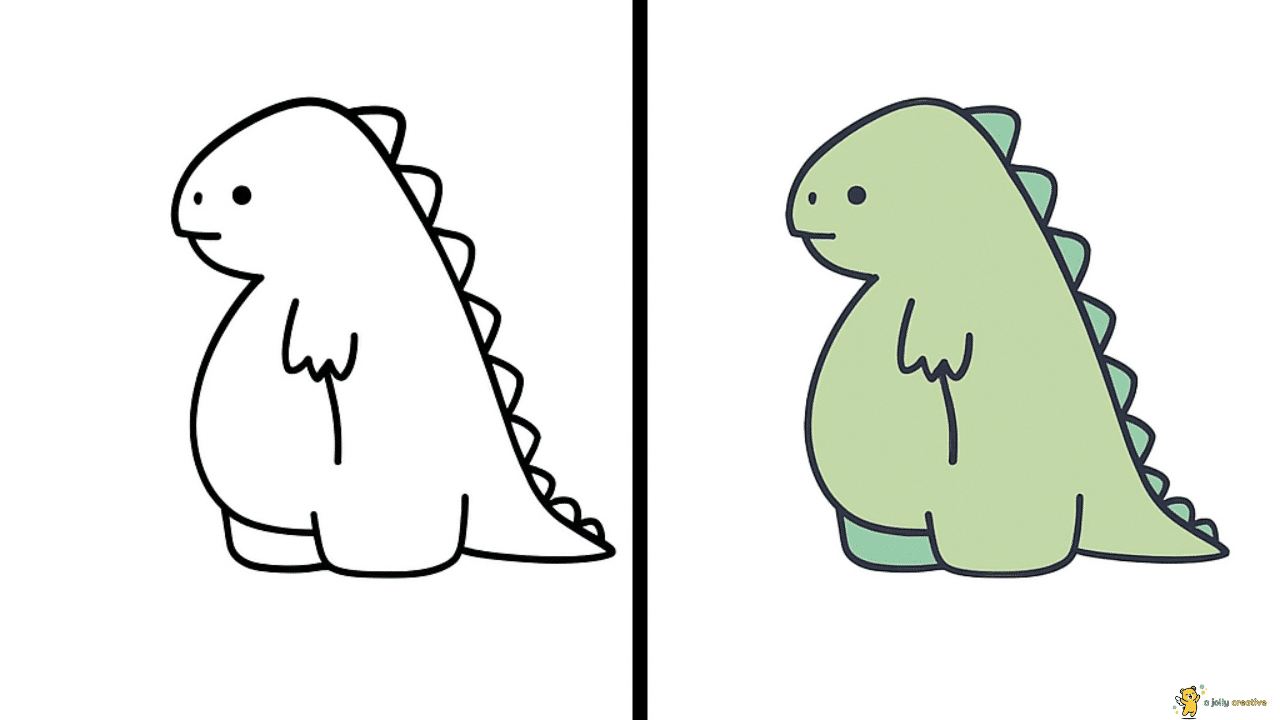
Master the basic standing pose before attempting more complex positions. This fundamental dinosaur drawing teaches proper proportions and weight distribution that forms the foundation for all other dinosaur poses. Start with a large oval body, medium circle head, and sturdy rectangular legs.
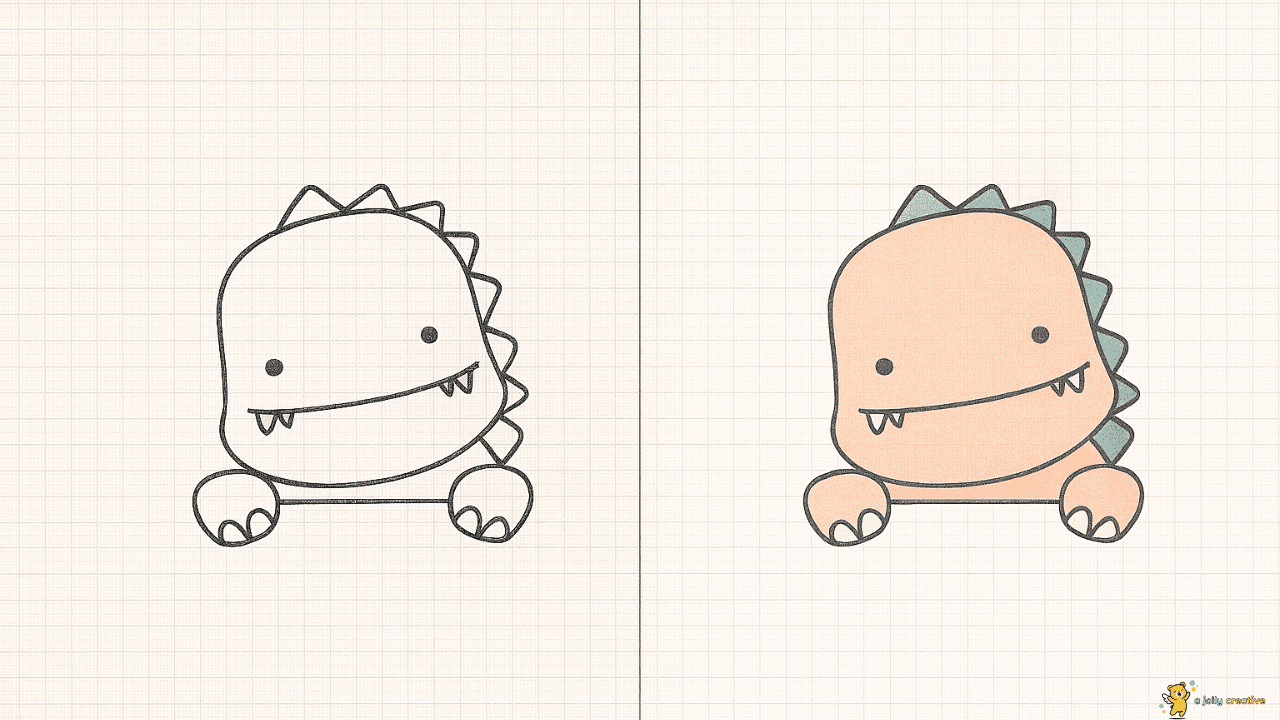
The tail should extend behind the body for natural balance, tapering gradually to a point. This anatomical element is crucial for realistic dinosaur appearance and provides visual stability to the overall design. Keep the pose upright and confident without appearing stiff or unnatural.
Friendly T-Rex with Butterfly
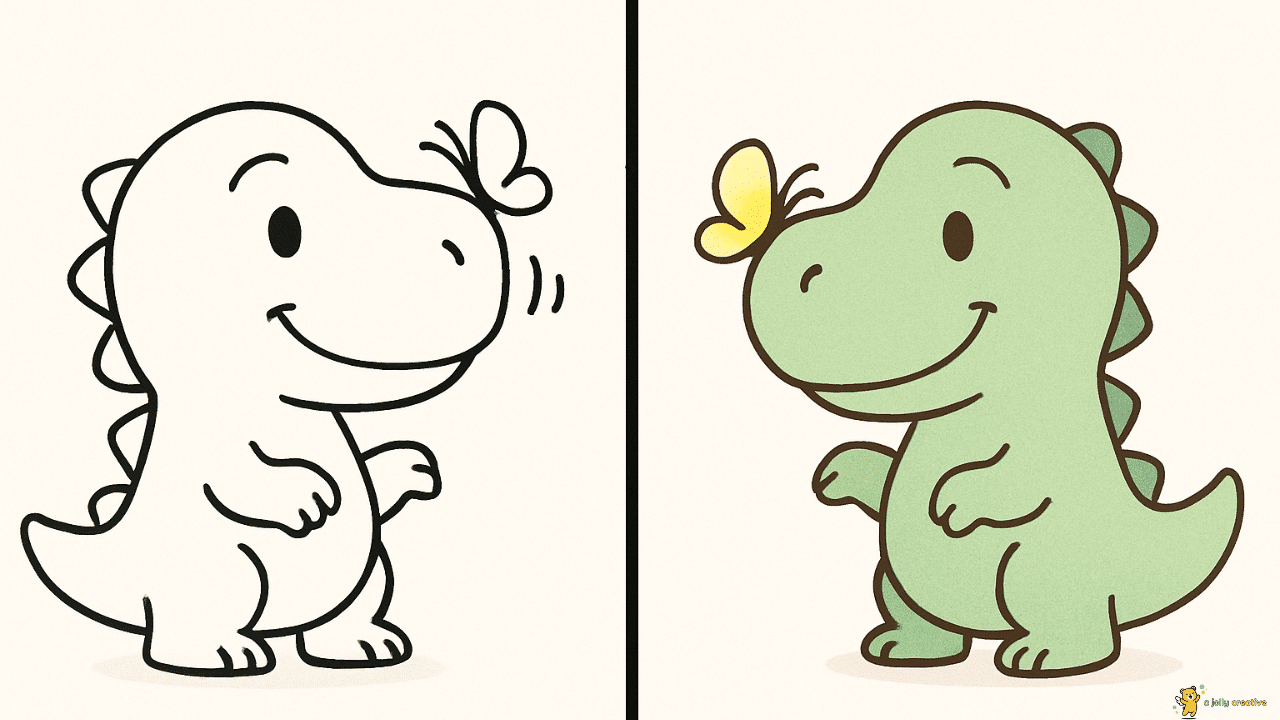
This whimsical scene transforms the most fearsome predator into a gentle giant fascinated by delicate beauty. Position the massive Tyrannosaurus Rex carefully examining a tiny butterfly that has landed on its nose, creating an unexpected moment of tenderness and wonder.
Dinosaur Tea Party
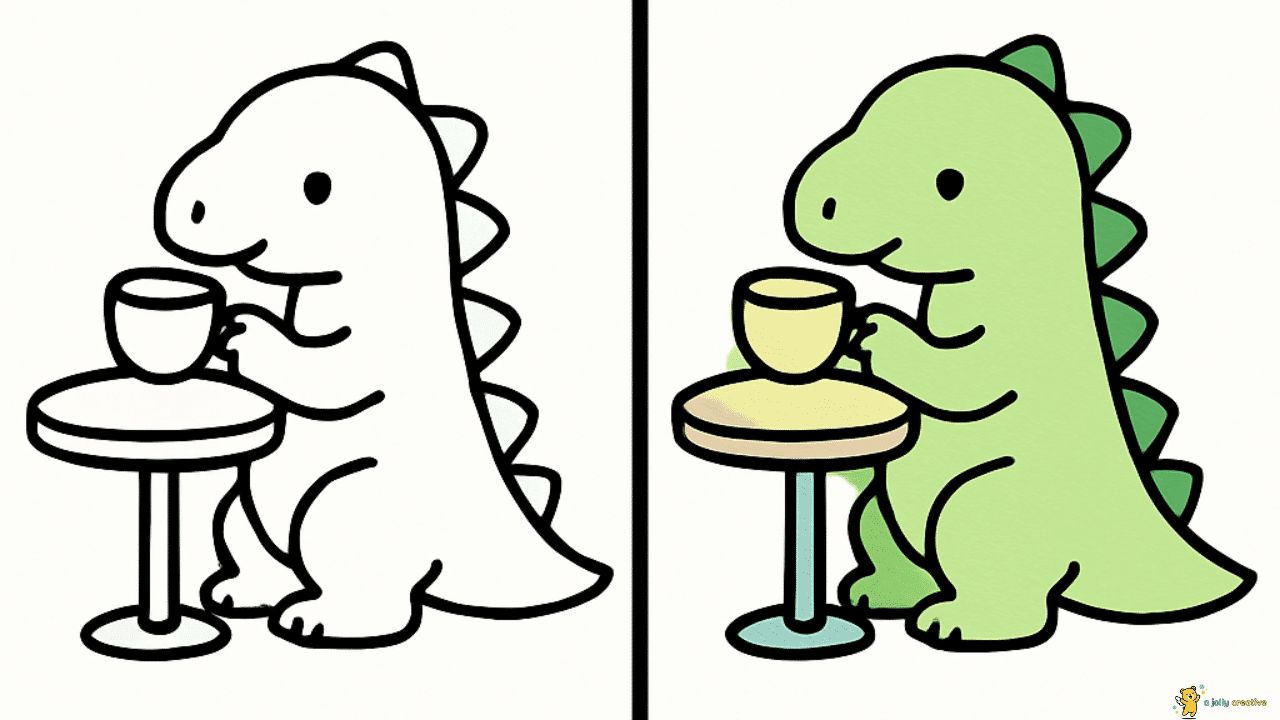
Multiple dinosaur species gathered around a tiny table for afternoon tea creates delightful storytelling opportunities. Position different dinosaurs – perhaps a Triceratops, Stegosaurus, and small raptor – each holding appropriately sized teacups with their claws or mouths in civilized, mannerly poses.
Don’t miss our article on: 25+ Cute and Easy Cow Drawing Ideas
Your Dinosaur Drawing Journey
Artistic development occurs gradually through consistent practice and patient experimentation. Every drawing session builds skills and confidence, regardless of immediate results or comparisons with other artists’ work.
Celebrating small victories and progress milestones maintains motivation during challenging learning periods. Art is a lifelong journey where improvement continues indefinitely, making each stage valuable and worthwhile.
The initial intimidation about drawing dinosaurs transforms into excitement and confidence through guided practice and supportive instruction. These prehistoric subjects provide endless inspiration for artistic exploration and creative storytelling.
Remember that professional artists once started as complete beginners facing the same uncertainties and challenges. Persistence, patience, and regular practice transform artistic dreams into achievable realities for anyone willing to begin their creative journey.
Hi, I’m Hazel Finch, a creativity enthusiast and writer at ajollycreative.com. I share easy drawing ideas, cozy gaming tips, and inspiration for creative hobbies. With a love for all things jolly and relaxing, I aim to help others discover the joy of creating in their own unique way. Follow my journey as I explore the world of art and play, one cozy activity at a time.

